
☐ | Preliminary Proxy Statement |
☐ | Confidential, for Use of the Commission Only (as permitted by Rule 14a-6(e)(2)) |
☒ | Definitive Proxy Statement |
☐ | Definitive Additional Materials |
☐ | Soliciting Material Pursuant to §240.14a-12 |
☒ | No fee required. | |||
☐ | Fee paid previously with preliminary materials | |||
☐ | Fee computed on table in exhibit required by Item 25(b) per Exchange Act Rules 14a-6(i)(1) and 0-11 | |||


 | Dear Shareholders: Please join us for The Travelers Companies, Inc. Annual Meeting of Shareholders on Wednesday, May 21, 2025, at 9:00 a.m. (Eastern Daylight Time) at the Hartford Marriott Downtown, 200 Columbus Boulevard, Hartford, Connecticut 06103. Attached to this letter are a Notice of Annual Meeting of Shareholders and Proxy Statement, which describe the business to be conducted at the meeting. At this year’s meeting, you will be asked to: •Elect the 10 director nominees listed in the Proxy Statement; •Ratify the appointment of KPMG LLP as our independent registered public accounting firm for 2025; •Consider a non-binding vote to approve executive compensation; •Approve an amendment to The Travelers Companies, Inc. 2023 Stock Incentive Plan; •Consider two shareholder proposals, if presented at the Annual Meeting; and •Consider such other business as may properly come before the Annual Meeting and any adjournments or postponements thereof. The Board of Directors recommends that you vote FOR each of the nominees listed in the Proxy Statement, FOR the ratification of KPMG LLP, FOR the non- binding vote to approve executive compensation, FOR the amendment to The Travelers Companies, Inc. 2023 Stock Incentive Plan and AGAINST each of the shareholder proposals described in the Proxy Statement. Your vote is important. Whether you own a few shares or many, and whether or not you plan to attend the Annual Meeting in person, it is important that your shares be represented and voted at the meeting. You may vote your shares by proxy on the Internet, by telephone, or by completing a paper proxy card and returning it by mail. You may also vote in person at the Annual Meeting. Thank you for your continued support of Travelers. Sincerely,  Alan D. Schnitzer Chairman and Chief Executive Officer |
Items of Business | ||||||
Logistics  DATE AND TIME May 21, 2025 9:00 a.m. (Eastern Daylight Time)  LOCATION* Hartford Marriott Downtown 200 Columbus Boulevard Hartford, Connecticut 06103  WHO CAN VOTE — RECORD DATE You may vote your shares if you were a shareholder of record or held shares through Travelers’ 401(k) Savings Plan or through a broker or nominee at the close of business on March 24, 2025. Shares held of record or through a broker or nominee may be voted in person at the Annual Meeting to be held on May 21, 2025 (the “Annual Meeting”). | ||||||
Board Vote Recommendation | ||||||
Elect the 10 director nominees listed in the Proxy Statement. |  | FOR each director nominee | ||||
Ratify the appointment of KPMG LLP as our independent registered public accounting firm for 2025. |  | FOR | ||||
Consider a non-binding vote to approve executive compensation. |  | FOR | ||||
Approve an amendment to The Travelers Companies, Inc. 2023 Stock Incentive Plan. |  | FOR | ||||
Consider two shareholder proposals, if presented at the Annual Meeting. |  | AGAINST | ||||
Voting by Proxy To ensure your shares are voted, you may vote your shares by proxy on the Internet, by telephone or by completing a paper proxy card and returning it by mail. Internet and telephone voting procedures are described in the General Information About the Meeting section of the Proxy Statement and on the proxy card. Shareholders will also consider such other business as may properly come before the Annual Meeting and any adjournments or postponements thereof. By Order of the Board of Directors,  Wendy C. Skjerven Corporate Secretary | ||||||
Advance Voting Methods  INTERNET www.proxyvote.com You will need the 16-digit number included on your Notice or on your proxy card.  TELEPHONE (800) 690-6903 You will need the 16-digit number included on your Notice or on your proxy card.  MAIL Mark, sign, date and promptly mail your proxy card in the postage-paid envelope, if you have received paper materials. | ||||||
*As part of our precautions for circumstances that could arise, we are planning for the possibility that the Annual Meeting may be held virtually over the Internet. If we take this step, we will announce the decision in advance, and details on how to participate will be available on our website at www.travelers.com under the “Investors” heading. | ||||||
Advance Voting Deadlines If you are a shareholder of record or hold shares through a broker or bank and are voting by proxy, your vote must be received by 11:59 p.m. (Eastern Daylight Time) on May 20, 2025, to be counted. If you hold shares through Travelers’ 401(k) Savings Plan, your vote must be received by 11:59 p.m. (Eastern Daylight Time) on May 19, 2025, to be counted. Those votes cannot be changed or revoked after that time, and those shares cannot be voted in person at the Annual Meeting. | ||||||
This Notice of Annual Meeting and the accompanying Proxy Statement are being distributed or made available, as the case may be, on or about April 4, 2025. | ||||||
1 | |||||
Shareholder Engagement and Board Responsiveness | |||||
Corporate Governance | |||||
Audit Committee Matters | |||||
Executive Compensation | |||||
34 | |||||
34 | |||||
WHERE TO OBTAIN FURTHER INFORMATION | |||||
We make available, free of charge on our website, all of our filings that are made electronically with the Securities and Exchange Commission (“SEC”), including Forms 10-K, 10-Q and 8-K. To access these filings, go to our website at www.travelers.com and click on “SEC Filings” under “Financial Information” under the “Investors” heading. Copies of our Annual Report on Form 10-K for the year ended December 31, 2024, including financial statements and schedules thereto, filed with the SEC, are also available without charge to shareholders upon written request addressed to: Corporate Secretary The Travelers Companies, Inc. 485 Lexington Avenue New York, NY 10017 | |||||
60 | |||||
ITEM 4 – Amendment to The Travelers Companies, Inc. 2023 Stock Incentive Plan | 77 | ||||
Shareholder Proposals | |||||
ITEM 5 – Shareholder Proposal – Report on Climate-Related Pricing and Coverage Decisions | |||||
ITEM 6 – Shareholder Proposal – Ratification of Golden Parachutes | |||||
Other Information | |||||
This Proxy Statement includes several website addresses and references to additional materials found on those websites. These websites and materials are not incorporated by reference herein. | |||||
109 | |||||
109 | |||||
A-1 | |||||
Annex B: The Travelers Companies, Inc. Amended and Restated 2023 Stock Incentive Plan | B-1 | ||||
2025 Proxy Statement | The Travelers Companies, Inc.  | 1 |
ITEM 1 | Election of Directors |  | Your Board recommends a vote FOR each director nominee. |
 | See Page 9 | ||
 | Russell G. Golden INDEPENDENT Chairman of Financial Accounting Standards Board (retired) Committees: Audit, Risk Director Since: 2023 |  | Todd C. Schermerhorn INDEPENDENT Senior Vice President and Chief Financial Officer of C. R. Bard, Inc. (retired) Independent Lead Director Committees: Audit, Executive, Risk (Chair) Director Since: 2016 |
 | Thomas B. Leonardi INDEPENDENT Executive Vice President of American International Group, Inc. and Vice Chairman of AIG Life Holdings, Inc. (retired) Committees: Compensation, Executive, Investment and Capital Markets, Nominating and Governance (Chair) Director Since: 2021 |  | Alan D. Schnitzer Chairman and Chief Executive Officer of Travelers Committees: Executive (Chair) Director Since: 2015 |
 | Clarence Otis Jr. INDEPENDENT Chairman and Chief Executive Officer of Darden Restaurants, Inc. (retired) Committees: Compensation (Chair), Executive, Investment and Capital Markets, Nominating and Governance Director Since: 2017 |  | Laurie J. Thomsen INDEPENDENT Co-Founder and Partner of Prism Venture Partners (retired) Committees: Audit, Risk Director Since: 2004 |
 | Elizabeth E. Robinson INDEPENDENT Global Treasurer of The Goldman Sachs Group, Inc. (retired) Committees: Compensation, Executive, Investment and Capital Markets (Chair), Nominating and Governance Director Since: 2020 |  | Bridget van Kralingen INDEPENDENT Senior Partner, Motive Partners Committees: Audit, Risk Director Since: 2022 |
 | Rafael Santana INDEPENDENT President and CEO of Westinghouse Air Brake Technologies Corporation Committees: Compensation, Investment and Capital Markets, Nominating and Governance Director Since: 2022 |  | David S. Williams INDEPENDENT Partner, Deloitte LLP (retired) Committees: Audit, Risk Director Since: 2024 |
2 | The Travelers Companies, Inc. | 2025 Proxy Statement  |
Recent Board Refreshment | ||||||||||||||
2020 1 new director •Elizabeth Robinson | 2021 1 new director •Thomas Leonardi 1 director retired | 2022 2 new directors •Rafael Santana •Bridget van Kralingen | 2023 1 new director •Russell Golden | 2024 1 new director •David Williams 4 directors retired | ||||||||||

INDEPENDENCE 9 of 10 |

AGE ~62 years average |

TENURE ~6 years average |

DIVERSITY ~60% diverse |

Corporate Governance Highlights |
Board Composition and Accountability | •All committees other than the Executive Committee are comprised solely of independent directors •Engaged independent Lead Director •Regular executive sessions of independent directors | •Active risk oversight •Director education on matters relevant to the Company, its business plan and risk profile •Annual Board evaluations |
Shareholder Rights | •Annually elected directors •Majority voting standard for director elections •Single voting class | •Proxy access •No poison pill |
Board Compensation | •Robust director stock ownership guidelines •Non-management directors currently receive more than 50% of their annual board and committee compensation in the form of deferred stock units | •Biennial review to assess the appropriateness of the Director Compensation Program |
2025 Proxy Statement | The Travelers Companies, Inc.  | 3 |
ITEM 2 | Ratification of Independent Registered Public Accounting Firm |  | Your Board recommends a vote FOR this Item. |
 | See Page 31 | ||
ITEM 3 | Non-Binding Vote to Approve Executive Compensation |  | Your Board recommends a vote FOR this Item. |
 | See Page 33 | ||
Executive Compensation Highlights |
Element | CEO Compensation Mix | Other NEOs | ||||
FIXED | Base Salary Page 46 | •Base salaries are appropriately aligned with Compensation Comparison Group. | 6% | 12% | ||
PERFORMANCE- BASED CASH | Annual Cash Bonus Page 47 | •The Compensation Committee evaluates a broad range of financial and non-financial metrics in awarding performance-based incentives. •Core return on equity is a principal factor in the Committee’s evaluation of the Company’s performance. The Committee also considers other metrics, including core income and core income per diluted share, and the metrics that contribute to those results. | 30% | 45% | ||
PERFORMANCE- BASED EQUITY | Long-Term Stock Incentives Page 53 | •Annual awards of stock-based compensation are typically in the form of stock options and performance shares. Because our performance shares only vest if specified performance thresholds are met, and because stock options provide value only if our stock price appreciates, the Compensation Committee believes that such compensation is all performance-based. •The mix of long-term incentives for the CEO and other named executive officers is 60% performance shares and 40% stock options, based on the grant date value of the awards. | 64% | 43% | ||
4 | The Travelers Companies, Inc. | 2025 Proxy Statement  |
 What We DO |  What We DO NOT Do | |
Provide for a cap on the maximum cash bonus  opportunity with regard to our Chief Executive Officer and, starting with annual cash bonuses to be awarded in 2026 for performance in 2025, all of our other named executive officers Maintain a robust share ownership requirement  Maintain clawback policies giving us the ability to  recover incentive awards from our executive officers Prohibit hedging transactions as specified in our  securities trading policy Prohibit pledging shares without the consent of the  Company (no pledges have been made) Engage in extensive outreach and maintain a regular  dialogue with shareholders relating to the Company’s governance, compensation and sustainability practices Engage an independent consultant that works directly  for the Compensation Committee and does not work for management | No excise tax “gross-up” payments in the event of a  change in control No tax “gross-up” payments on perquisites for named  executive officers No repricing of stock options and no buy-out of  underwater options No excessive or unusual perquisites  No dividends or dividend equivalents paid on  unvested performance shares No above-market returns provided for in deferred  compensation plans No guaranteed equity awards or bonuses for named  executive officers | |
ITEM 4 | Amendment to The Travelers Companies, Inc. 2023 Stock Incentive Plan |  | Your Board recommends a vote FOR this Item. |
 | See Page 77 | ||
ITEMS 5-6 | Shareholder Proposals |  | Your Board recommends a vote AGAINST these Items. |
 | See Pages 85–95 | ||
2025 Proxy Statement | The Travelers Companies, Inc.  | 5 |
PRIOR YEARS | MOST RECENT FIVE YEARS | |||||
•Significantly enhanced disclosure regarding pay practices, board tenure and political contributions and lobbying activities | •Amended the Company’s Nominating and Governance Committee charter to reference its oversight responsibilities, including with respect to political contributions, lobbying and charitable giving | •Further enhanced disclosure regarding political contributions and lobbying activities | •Significantly enhanced the disclosures in the Company’s TCFD Report with respect to the Company’s underwriting and investment portfolios | •Provided additional disclosure regarding the composition of the Company’s investment portfolio, including a quantification of greenhouse gas emissions for a portion of the portfolio where data is available | •Implemented a relative total shareholder return modifier to the Company’s performance share awards | |
•Adopted a new policy related to the underwriting of, and investment in, coal/oil sands | ||||||
•Significantly enhanced disclosure regarding the Board’s oversight of the Company’s enterprise risk management program, including with respect to risks related to changing climate conditions | •Implemented a cap on the maximum cash bonus opportunity applicable to all the Company’s named executive officers | |||||
•Began publishing comprehensive sustainability reports on an annual basis, including reports that generally align with SASB standards and TCFD recommendations | •Significantly enhanced the Company’s TCFD Report, including by disclosing the results of climate scenario analyses conducted by independent, third- party firms with respect to the Company’s investment portfolio and certain aspects of its underwriting portfolio | •Fully implemented a shareholder proposal relating to lobbying by providing trade association disclosure | ||||
•Provided enhanced disclosure with respect to the composition of the Company’s business mix as it relates to the energy industry | ||||||
•Clarified the authority of the Board’s independent Lead Director in the Company’s Governance Guidelines | ||||||
•Amended the Company’s executive stock ownership policy | ||||||
•Modified the Company’s workforce diversity disclosure by disclosing its consolidated EEO-1 report | ||||||
•Significantly enhanced disclosure regarding the Company’s robust governance and controls relating to underwriting and pricing | ||||||
6 | The Travelers Companies, Inc. | 2025 Proxy Statement  |
With whom we engaged | In 2024 and through the date of the filing of this proxy statement, we sought to meet with shareholders representing approximately 52% of the Company’s outstanding shares and engaged with shareholders representing approximately 45% of its outstanding shares. During that period and as part of our extensive outreach program, we met with many of our largest shareholders multiple times. We: •sought to meet with each of our top 20 shareholders and met with each of our top 10 shareholders and 14 of our top 20 shareholders; and •met with eight of our top 20 shareholders two or more times, and two of our top 10 shareholders three or more times. | |||
Our representatives | Members of the Company’s senior management and Board of Directors participated in our extensive engagements. Participants from the Company’s Board of Directors and senior management included, as appropriate, Travelers’: | |||
•CEO and Chairman of the Board •Chairman of Compensation Committee •Chairman of the Nominating and Governance Committee •Chief Sustainability Officer | •Chief Underwriting Officer •Corporate Secretary •Senior Vice President, Investor Relations •Vice Chairman and Chief Legal Officer | |||
Topics discussed | Topics discussed included, among others: •board composition and refreshment; •our comprehensive climate strategy and the board’s oversight of that strategy; •our deliberate risk/reward approach to underwriting; •our investment philosophy that focuses on stable and appropriate risk-adjusted returns; | •our executive compensation program; •the robust governance, processes and controls we have in place with respect to underwriting and pricing and the use of artificial intelligence; •our long-term approach to human capital management; and •our unique corporate culture. | ||
2025 Proxy Statement | The Travelers Companies, Inc.  | 7 |
Topics discussed | Our response | |||
Target levels used for performance share payouts. Most investors were supportive of the Company’s process for determining target levels for performance share payouts and supportive of the target levels. A few investors sought confirmation that the Compensation Committee evaluates the targets used for performance share payouts on an annual basis to ensure that targets remain sufficiently rigorous. | As we have disclosed in past proxy statements, the Compensation Committee carefully assesses the targets used for performance share payouts on an annual basis to confirm that such targets remain sufficiently challenging. As part of its annual process and to reflect current underwriting and investment market conditions, the Compensation Committee increased the core return on equity targets required to achieve each vesting percentage included in the 2025 performance share awards by 75 basis points, and we enhanced our corresponding proxy statement disclosure. See page 56. | |||
Use of a relative performance metric to determine performance share payouts. Most investors were supportive of the use of financial targets related to core return on equity in our performance share awards. A few investors expressed their view that performance share payouts should also include a relative performance component. | In response to investor feedback, starting with performance share awards granted in 2025, the Compensation Committee included a relative total shareholder return (“rTSR”) modifier with respect to the Company’s performance share awards, and we enhanced our corresponding proxy statement disclosure. See page 57. | |||
Limits on annual bonus for executive officers. In addition to the existing cap on the maximum cash bonus opportunity for the CEO, a few shareholders expressed a preference for limits on the maximum cash bonus payouts for our other named executive officers. | In response to investor feedback, the Compensation Committee expanded the cap on the maximum cash bonus opportunity beyond the CEO to include all named executive officers, and we enhanced our corresponding proxy statement disclosure. See page 50. |



8 | The Travelers Companies, Inc. | 2025 Proxy Statement  |
2025 Proxy Statement | The Travelers Companies, Inc.  | 9 |
ITEM 1 | Election of Directors |  | Your Board recommends you vote FOR the election of all director nominees. |
Russell G. Golden INDEPENDENT | ||
 | ||
BACKGROUND Mr. Golden, age 54, served as Chairman of the Financial Accounting Standards Board (“FASB”) from 2013 until his retirement in 2020. Mr. Golden joined the FASB in 2004 and served as Chair of its Emerging Issues Task Force from 2007 to 2010. Prior to joining the FASB, from 1992 to 2003, Mr. Golden served in various roles at Deloitte & Touche LLP, including as a partner. Mr. Golden currently serves as the Chairman of the PricewaterhouseCoopers Assurance Quality Advisory Committee and is a member of the faculty of the W.P. Carey School of Business at Arizona State University. OTHER BOARD SERVICE Mr. Golden does not currently serve on any other public company boards. NOMINATION CONSIDERATIONS The Board and the Nominating and Governance Committee considered in particular Mr. Golden’s experience as a leader of the U.S. accounting standards setting organization, experience as an audit partner of a registered public accounting firm and his significant experience and expertise in financial reporting, auditing, audit quality and sustainability disclosure. | ||
Director Since: 2023 Committees: Audit, Risk |
Thomas B. Leonardi INDEPENDENT | ||
 | ||
BACKGROUND Mr. Leonardi, age 71, served as Executive Vice President of American International Group, Inc., a global insurance and finance company, and Vice Chairman of AIG Life Holdings, Inc. (now known as Corebridge Financial) from November 2017 until his retirement in May 2020, where he was responsible for Government Affairs, Public Policy, Communications and Sustainability. From January 2015 to October 2017, he was a Senior Advisor to Evercore Inc., a global investment banking advisory firm. Previously, Mr. Leonardi was Commissioner of the Connecticut Insurance Department from February 2011 to December 2014. For 22 years prior to his appointment as Commissioner, he was Chairman and Chief Executive Officer of Northington Partners Inc., a venture capital and investment banking firm. Before Northington, he was head of the investment banking and venture capital divisions of Conning & Company and President of Beneficial Corporation’s insurance subsidiaries. He began his career as a litigation attorney in Connecticut. OTHER BOARD SERVICE Mr. Leonardi does not currently serve on any other public company boards. Mr. Leonardi is a director of Athene Co-Invest Reinsurance Affiliate, Ltd. 1A and Athene Co-Invest Reinsurance Affiliate, Ltd. 2A. NOMINATION CONSIDERATIONS The Board and the Nominating and Governance Committee considered in particular Mr. Leonardi’s experience as an insurance commissioner and his significant experience and expertise in management, investments, finance, mergers and acquisitions and the insurance industry. | ||
Director Since: 2021 Committees: Compensation, Executive, Investment and Capital Markets, Nominating and Governance (Chair) |
10 | The Travelers Companies, Inc. | 2025 Proxy Statement  |
Clarence Otis Jr. INDEPENDENT | ||
 | ||
BACKGROUND Mr. Otis, age 68, served as Chairman and Chief Executive Officer of Darden Restaurants, Inc., the largest company-owned and operated full-service restaurant company in the world. He became Darden’s Chief Executive Officer in 2004, assumed the additional role of Chairman in 2005 and served in both capacities until his retirement in 2014. Mr. Otis joined Darden Restaurants, Inc. in 1995 and served in various roles with Darden, including Vice President and Treasurer, and Senior Vice President and Chief Financial Officer. OTHER BOARD SERVICE Mr. Otis is a director of Verizon Communications, Inc., VF Corporation and MFS Mutual Funds. NOMINATION CONSIDERATIONS The Board and the Nominating and Governance Committee considered in particular Mr. Otis’s experience as a public company CEO and his significant experience and expertise in operations, financial oversight and risk management. | ||
Director Since: 2017 Committees: Compensation (Chair), Executive, Investment and Capital Markets, Nominating and Governance |
Elizabeth E. Robinson INDEPENDENT | ||
 | ||
BACKGROUND Ms. Robinson, age 56, served as Global Treasurer, Partner and Managing Director of The Goldman Sachs Group, Inc., the global financial services company, from 2005 to 2015. Prior to that, she served in various roles within Corporate Treasury of The Goldman Sachs Group, Inc., including Americas Treasurer and Managing Director, and in the Financial Institutions Group within the Investment Banking Division of Goldman Sachs. OTHER BOARD SERVICE Ms. Robinson is a director of The Bank of New York Mellon Corporation and BNY Mellon Government Securities Services Corp. Ms. Robinson is also a Trustee of Every Mother Counts, St. Luke’s University Health Network and Blair Academy. NOMINATION CONSIDERATIONS The Board and the Nominating and Governance Committee considered in particular Ms. Robinson’s experience as treasurer of a large global financial institution, a position she held during the 2008 financial crisis, her significant experience in managing a financial services company through challenging financial conditions and her expertise in finance, risk management, capital management and strategic transactions. | ||
Director Since: 2020 Committees: Compensation, Executive, Investment and Capital Markets (Chair), Nominating and Governance |
Rafael Santana INDEPENDENT | ||
 | ||
BACKGROUND Mr. Santana, age 53, is President and Chief Executive Officer of Westinghouse Air Brake Technologies Corporation (“Wabtec”), a leading global provider of equipment, systems, digital solutions, and value- added services for the freight and transit rail sectors. Previously, from November 2017 to February 2019, Mr. Santana served as President and Chief Executive Officer of GE Transportation, a division of General Electric Company. Mr. Santana joined GE in 2000 and held a variety of global leadership roles in the transportation, power, and oil and gas businesses, including President and Chief Executive Officer of GE, Latin America, President and Chief Executive Officer of GE Oil and Gas Turbomachinery Solutions, Chief Executive Officer of GE Gas Engines and Chief Executive Officer of GE Energy Latin America. OTHER BOARD SERVICE Mr. Santana is a director of Wabtec. NOMINATION CONSIDERATIONS The Board and the Nominating and Governance Committee considered in particular Mr. Santana’s experience as a public company CEO and his significant experience and expertise in management, international operations and financial oversight. | ||
Director Since: 2022 Committees: Compensation, Investment and Capital Markets, Nominating and Governance |
2025 Proxy Statement | The Travelers Companies, Inc.  | 11 |
Todd C. Schermerhorn INDEPENDENT | ||
 | ||
BACKGROUND Mr. Schermerhorn, age 64, served as Senior Vice President and Chief Financial Officer of C. R. Bard, Inc., a multinational developer, manufacturer and marketer of life-enhancing medical technologies, from 2003 until his retirement in 2012. Prior to that, he had been Vice President and Treasurer of C. R. Bard from 1998 to 2003. From 1985 to 1998, Mr. Schermerhorn held various other management positions with C. R. Bard. OTHER BOARD SERVICE Mr. Schermerhorn is a director of Metabolon, Inc. and LivaNova PLC. NOMINATION CONSIDERATIONS The Board and the Nominating and Governance Committee considered in particular Mr. Schermerhorn’s experience as a public company Chief Financial Officer and his significant experience and expertise in management, accounting and business operations, including international operations. | ||
Lead Director Director Since: 2016 Committees: Audit, Executive, Risk (Chair) |
Alan D. Schnitzer | ||
 | ||
BACKGROUND Mr. Schnitzer, age 59, is Chairman and Chief Executive Officer of Travelers. He was previously the Company’s Vice Chairman and Chief Executive Officer, Business and International Insurance from July 2014 to December 2015. He joined Travelers as Vice Chairman and Chief Legal Officer in April 2007, and between that time and July 2014 he held operating and functional positions of increasing responsibility. Prior to joining the Company, he was a partner at Simpson Thacher & Bartlett LLP. OTHER BOARD SERVICE Mr. Schnitzer does not currently serve on any other public company boards. Mr. Schnitzer serves as a trustee of the University of Pennsylvania and Memorial Sloan Kettering Cancer Center, and as a director of New York City Ballet and the Business Roundtable. NOMINATION CONSIDERATIONS The Board and the Nominating and Governance Committee considered in particular Mr. Schnitzer’s position as Chief Executive Officer of the Company and his significant experience in the management of the Company in various roles, including as Chief Executive Officer of Business and International Insurance, the Company’s largest business segment, as well as his significant experience and expertise in management, finance and law. | ||
Chairman of the Board Director Since: 2015 Committees: Executive (Chair) |
Laurie J. Thomsen INDEPENDENT | ||
 | ||
BACKGROUND Ms. Thomsen, age 67, served as an Executive Partner of New Profit, Inc., a venture philanthropy firm, from 2006 to 2010, and she served on its board from 2001 to 2006. Prior to that, from 1995 to 2004, she was a co-founder and General Partner of Prism Venture Partners, a venture capital firm investing in healthcare and technology companies. From 1984 until 1995, she worked at the venture capital firm Harbourvest Partners in Boston, where she was a General Partner from 1988 until 1995. Ms. Thomsen was in commercial lending at U.S. Trust Company of New York from 1979 until 1984. OTHER BOARD SERVICE Ms. Thomsen is a director of Dycom Industries and MFS Mutual Funds. She is also an emeritus Trustee of Williams College. NOMINATION CONSIDERATIONS The Board and the Nominating and Governance Committee considered in particular Ms. Thomsen’s experience as a general partner of a venture capital firm and her significant experience and expertise in investments, finance and the development of emerging businesses. | ||
Director Since: 2004 Committees: Audit, Risk |
12 | The Travelers Companies, Inc. | 2025 Proxy Statement  |
Bridget van Kralingen INDEPENDENT | ||
 | ||
BACKGROUND Ms. van Kralingen, age 61, is a Senior Partner and member of the executive committee, leading portfolio performance and value creation, at Motive Partners, a specialist private investment firm focused on technology enabled financial and business services companies. Prior to joining Motive Partners in 2022, Ms. van Kralingen served as Senior Vice President of International Business Machines Corporation (“IBM”), the multinational technology company. Ms. van Kralingen joined IBM in 2004 and held a number of positions of increasing responsibility, including Senior Vice President, Global Markets & Sales, Senior Vice President, Global Industries, Clients, Platforms and Blockchain, Senior Vice President, Global Business Services, General Manager IBM North America, General Manager, Global Business Services in Europe, Middle East and Africa and Global Managing Partner, Financial Services Sector, Global Business Services. Prior to that, Ms. van Kralingen served as Managing Partner, US Financial Services with Deloitte Consulting. OTHER BOARD SERVICE Ms. van Kralingen is a director of Discovery Limited, Schrodinger, Inc. and Teradyne, Inc. and a board member of the New York Historical Society and IEX Group, Inc. Ms. van Kralingen was a director of Royal Bank of Canada until April 2024. NOMINATION CONSIDERATIONS The Board and the Nominating and Governance Committee considered in particular Ms. van Kralingen’s experience as an executive of a global technology and services company and her significant experience and expertise in information technology services, international operations and global sales and business development. | ||
Director Since: 2022 Committees: Audit, Risk |
David S. Williams INDEPENDENT | ||
 | ||
BACKGROUND Mr. Williams, age 62, served as a Principal and Lead Relationship Partner with Deloitte LLP before retiring in 2024. Mr. Williams joined Deloitte in 2002 and previously served as Managing Principal – Public Policy, Government Relations and Corporate Citizenship from 2015 to 2017. Mr. Williams served as Chairman and Chief Executive Officer of Deloitte Financial Advisory Services LLP from 2008 to 2015 and as Chairman and Chief Executive Officer of Deloitte Transactions and Business Analytics LLP from 2011 to 2015. He was a client service partner from 2002 to 2008 and served as a member of Deloitte’s U.S. Board of Directors from 2005 to 2008, including on its Governance, Compensation and Succession Committees. Prior to joining Deloitte, Mr. Williams served in various roles with PricewaterhouseCoopers from 1985 to 2002. OTHER BOARD SERVICE Mr. Williams does not currently serve on any other public company boards. NOMINATION CONSIDERATIONS The Board and the Nominating and Governance Committee considered in particular Mr. Williams’ experience as Chief Executive Officer of a financial advisory services business and his significant experience and expertise in accounting, strategic planning and risk management. | ||
Director Since: 2024 Committees: Audit, Risk |
2025 Proxy Statement | The Travelers Companies, Inc.  | 13 |
Governance Highlights |
Board Composition and Accountability | |
Independence | All of our director nominees other than our Chief Executive Officer are independent. |
Committee independence | All committees are comprised of independent directors other than the Executive Committee on which our Chief Executive Officer serves. |
Independent Chair or independent Lead Director | The Board has an independent Chair or independent Lead Director whenever the Chair is a member of management or not otherwise independent. |
Executive session | Independent members of the Board and each of the committees regularly meet in executive session with no member of management present. |
Risk oversight | The Board and committees annually review their oversight of risk and the allocation of risk oversight among the committees. |
Director education | The Nominating and Governance Committee oversees educational sessions for directors on matters relevant to the Company, its business plan and risk profile. |
Board evaluation | The Board and each of its committees evaluate and discuss their respective performance and effectiveness every year. |
Diversity of skills and experience | The composition of the Board encompasses a broad range of skills, expertise, experience and backgrounds. |
Board tenure | The Board’s balanced approach to refreshment results in an appropriate mix of long-serving and new directors. |
Shareholder Rights | |
Annually elected directors | The annual election of directors reinforces the Board’s accountability to shareholders. |
Majority voting standard for director elections | Directors must be elected under a “majority voting” standard in uncontested elections — a director who receives fewer votes “For” his or her election than “Against” must promptly tender his or her resignation to the Board. |
Single voting class | Our common stock is the only class of shares outstanding. |
Proxy access | Each shareholder, or a group of up to 20 shareholders, owning 3% or more of our common stock continuously for at least three years may, in accordance with the terms specified in our bylaws, nominate and include in our proxy materials director nominees constituting the greater of two directors or 20% of the Board. |
Special meetings | Special meetings may be called at any time by a shareholder or shareholders holding 10% of voting power of all shares entitled to vote or 25% where the meeting relates to a business combination. |
Poison pill | The Company does not have a poison pill. |
Board Compensation | |
Director stock ownership | Non-employee directors are required to accumulate and retain a level of ownership of our equity securities to align the interests of non-employee directors and shareholders. |
Deferred stock units | Non-employee directors currently receive more than 50% of their annual board and committee compensation in the form of deferred stock units, and the shares underlying these units are not distributed to a director until at least six months after the director leaves the Board. |
Compensation review | The Nominating and Governance Committee reviews the appropriateness of the Director Compensation Program at least once every two years. |
14 | The Travelers Companies, Inc. | 2025 Proxy Statement  |
Governance Structure of the Board – Chairman and Lead Director |
Alan D. Schnitzer CHAIRMAN AND CHIEF EXECUTIVE OFFICER | ||
 | ||
Mr. Schnitzer serves as Chairman of the Board and Chief Executive Officer. The combined role of Chairman and Chief Executive Officer, in the case of the Company, means that the Chair of the Board has longstanding experience with property and casualty insurance and ongoing executive responsibility for the Company. In the Board’s view, this enables the Board to better understand the Company and work with management to enhance shareholder value. In addition, the Board believes that this structure enables it to better fulfill its risk oversight responsibilities and enhances the ability of the Chief Executive Officer to effectively communicate the Board’s view to management. |
Todd C. Schermerhorn INDEPENDENT LEAD DIRECTOR | ||
 | ||
The independent directors elected Mr. Schermerhorn to serve as independent Lead Director of the Board. Among other things, under our Governance Guidelines, the independent Lead Director has the authority to: •convene, set the agendas for and chair the regular executive sessions of the independent directors; •convene and chair other meetings of the independent directors as deemed necessary; •approve the Board meeting schedules and meeting agenda items and review information to be sent to the Board; •act as a liaison between the independent directors, committee chairs and senior management; •receive and review correspondence sent to the Company’s office addressed to the Board or independent directors and, together with the CEO, to determine appropriate responses if any; and •in concert with the chairs of the Board’s committees, recommend to the Board the retention of consultants and advisors who directly report to the Board, without consulting or obtaining the advance authorization of any officer of the Company. In addition, in accordance with our Governance Guidelines, the Lead Director is responsible for coordinating the efforts of the independent and non-management directors “in the interest of ensuring that objective judgment is brought to bear on sensitive issues involving the management of the Company and, in particular, the performance of senior management”. |
2025 Proxy Statement | The Travelers Companies, Inc.  | 15 |
Committees of the Board and Meetings |
DIRECTOR INDEPENDENCE •The Board has determined that each person nominated for election at the Annual Meeting is independent, other than Mr. Schnitzer, who currently serves as our Chairman and Chief Executive Officer. •Each committee of the Board, other than the Executive Committee on which Mr. Schnitzer serves, is composed solely of independent directors, consistent with our Governance Guidelines, the applicable New York Stock Exchange (“NYSE”) listing standards and the applicable rules of the SEC. | BOARD MEETINGS AND ATTENDANCE •The Board held five meetings in 2024. •Each director attended 75% or more of the total number of meetings of the Board and of the committees on which each such director served during 2024. •Directors are encouraged and expected, but not required, to attend each annual meeting of shareholders. All of the 2024 director nominees attended last year’s annual meeting of shareholders. |
MEMBERS ALL INDEPENDENT | Russell G. Golden William J. Kane (Chair) | Todd C. Schermerhorn Laurie J. Thomsen | Bridget van Kralingen David S. Williams | Meetings in 2024: 9 |
16 | The Travelers Companies, Inc. | 2025 Proxy Statement  |
MEMBERS ALL INDEPENDENT | Thomas B. Leonardi Clarence Otis Jr. (Chair) | Elizabeth E. Robinson Rafael Santana | Meetings in 2024: 5 | |
2025 Proxy Statement | The Travelers Companies, Inc.  | 17 |
MEMBERS | William J. Kane Thomas B Leonardi | Clarence Otis Jr. Elizabeth E. Robinson | Todd C. Schermerhorn Alan D. Schnitzer (Chair) | Meetings in 2024: 0 |
MEMBERS ALL INDEPENDENT | Thomas B. Leonardi Clarence Otis Jr. | Elizabeth E. Robinson (Chair) Rafael Santana | Meetings in 2024: 5 | |
18 | The Travelers Companies, Inc. | 2025 Proxy Statement  |
MEMBERS ALL INDEPENDENT | Thomas B. Leonardi (Chair) Clarence Otis Jr. | Elizabeth E. Robinson Rafael Santana | Meetings in 2024: 4 | |
MEMBERS ALL INDEPENDENT | Russell G. Golden William J. Kane | Todd C. Schermerhorn (Chair) Laurie J. Thomsen | Bridget van Kralingen David S. Williams | Meetings in 2024: 4 |
2025 Proxy Statement | The Travelers Companies, Inc.  | 19 |
Board and Committee Evaluations |
Director Nominations |
20 | The Travelers Companies, Inc. | 2025 Proxy Statement  |
SINCE 2020: 6 new independent directors | 2020 | 2021 | 2022 | 2023 | 2024 | |||
 Elizabeth E. Robinson |  Thomas Leonardi |  Rafael Santana |  Bridget van Kralingen |  Russell G. Golden |  David S. Williams | |||
Specific Considerations Regarding the 2025 Nominees |
2025 Proxy Statement | The Travelers Companies, Inc.  | 21 |
INDEPENDENCE 9 of 10 |

AGE ~62 years average |

TENURE ~6 years average |

DIVERSITY ~60% diverse |

Director Age Limit |
Director Independence and Independence Determinations |
22 | The Travelers Companies, Inc. | 2025 Proxy Statement  |
Sustainability and Risk Management |
•Business Strategy & Competitive Advantages •Capital and Risk Management •Climate Strategy •Community •Customer Experience •Data Privacy & Cybersecurity •Disaster Preparedness & Response •Diversity & Inclusion | •Eco-Efficient Operations •Ethics & Responsible Business Practices •Governance Practices •Human Capital Management •Innovation •Investment Management •Public Policy •Safety & Health |
2025 Proxy Statement | The Travelers Companies, Inc.  | 23 |
Committee | Responsible for Oversight of: |
Audit | •Risks related to the integrity of the Company’s financial statements, including oversight of financial reporting principles and policies and internal controls. •The Company’s process for establishing insurance reserves. •Risks related to regulatory and compliance matters. |
Compensation | •Certain human capital management matters, including the Company’s compensation and pay-for-performance philosophy, compensation program objectives and practices designed to ensure equitable pay across the organization. •Risks related to the Company’s compensation programs, including with respect to formulation and administration of those programs and regulatory compliance with respect to compensation matters. |
Investment and Capital Markets | •Risks related to the Company’s investment portfolio (including valuation and credit risks), capital structure, financing arrangements and liquidity. |
Nominating and Governance | •Risks related to corporate governance matters, including director independence and related person transactions. •Certain human capital management matters, including the Company’s succession planning, the employee code of conduct and workforce diversity and inclusion efforts; public policy initiatives; and community relations. |
Risk | •The Company’s Enterprise Risk Management activities. •Risks related to the Company’s business operations, including insurance underwriting and claims; reinsurance; catastrophe risk and the impact of changing climate conditions; credit risk in insurance operations; and information technology, including cybersecurity. •The Company’s business resiliency planning. |
Each committee is also responsible for monitoring reputational risk to the extent arising out of its area of responsibility. | |
24 | The Travelers Companies, Inc. | 2025 Proxy Statement  |
Risk Management and Compensation |
Dating and Pricing of Equity Grants |
Securities Trading Policy |
2025 Proxy Statement | The Travelers Companies, Inc.  | 25 |
Code of Business Conduct and Ethics |
Ethics Helpline |
Communications with the Board |
Transactions with Related Persons |
26 | The Travelers Companies, Inc. | 2025 Proxy Statement  |
2025 Proxy Statement | The Travelers Companies, Inc.  | 27 |
28 | The Travelers Companies, Inc. | 2025 Proxy Statement  |
Elements of Non-Employee Director Compensation |
Element | Timing | |||||
CASH | ||||||
Annual Retainer | Each non-employee director receives an annual retainer of $135,000. | Annual retainers and committee chair fees are paid in quarterly installments, in arrears at the end of each quarter, either: (1) in cash or (2) if the director so elects, in common stock units credited to his or her deferred compensation account (discussed under “Director Deferral Plan” below) and distributed at a later date designated by the director. | ||||
ADDITIONAL FEES | ||||||
Committee Chair Fees and Lead Director Retainer | The chairs of certain committees are paid additional fees in cash in connection with their services as follows: •Audit Committee - $35,000 •Compensation Committee - $30,000 •Nominating and Governance Committee - $25,000 •Investment and Capital Markets Committee - $25,000 •Risk Committee - $35,000 The Lead Director is paid an additional $50,000 annual cash retainer. | |||||
EQUITY | ||||||
Annual Deferred Stock Award | Under the Director Compensation Program, during 2024, each non-employee director nominated for re-election to the Board was awarded $195,000 in deferred stock units. The deferred stock units were granted under our 2023 Stock Incentive Plan and vest in full one day prior to the date of the annual shareholder meeting occurring in the year following the year of the date of grant so long as the non-employee director continuously serves on the Board through that date. The value of deferred stock units rises or falls as the price of our common stock fluctuates in the market. Dividend equivalents (in an amount equal to the dividends paid on shares of our common stock) on the deferred stock units are deemed “reinvested” in additional deferred stock units. Directors are subject to a stock ownership target as described under “Director Stock Ownership” below. | The accumulated deferred stock units, including associated dividend equivalents, in a director’s account are distributed in the form of shares of our common stock either in a lump sum or in annual installments, at the director’s election, beginning at least six months following termination of his or her service as a director. | ||||
2025 Proxy Statement | The Travelers Companies, Inc.  | 29 |
Director Deferral Plan |
Director Stock Ownership |
30 | The Travelers Companies, Inc. | 2025 Proxy Statement  |
Director Compensation for 2024 |
Name | Fees Earned or Paid in Cash(1) ($) | Stock Awards(2) ($) | All Other Compensation ($) | Total ($) |
Alan L. Beller(3) | 50,440 | — | — | 50,440 |
Janet M. Dolan(3) | 50,440 | — | — | 50,440 |
Russell G. Golden | 135,000 | 194,904 | — | 329,904 |
Patricia L. Higgins(3) | 50,440 | — | — | 50,440 |
William J. Kane | 170,000 | 194,904 | — | 364,904 |
Thomas B. Leonardi | 150,728 | 194,904 | — | 345,632 |
Clarence Otis Jr. | 165,000 | 194,904 | — | 359,904 |
Elizabeth E. Robinson | 160,000 | 194,904 | — | 354,904 |
Philip T. Ruegger III(3) | 59,780 | — | — | 59,780 |
Rafael Santana | 135,000 | 194,904 | — | 329,904 |
Todd C. Schermerhorn | 220,000 | 194,904 | — | 414,904 |
Laurie J. Thomsen | 135,000 | 194,904 | — | 329,904 |
Bridget van Kralingen | 135,000 | 194,904 | — | 329,904 |
David S. Williams(4) | 84,931 | 195,059 | — | 279,990 |
Name | Unvested Deferred Stock Units (#) | Common Stock Units and Vested Deferred Stock Units (#) |
Russell G. Golden | 931 | 2,136 |
William J. Kane | 931 | 22,050 |
Thomas B. Leonardi | 931 | 3,294 |
Clarence Otis Jr. | 931 | 14,507 |
Elizabeth E. Robinson | 931 | 8,938 |
Rafael Santana | 931 | 2,101 |
Todd C. Schermerhorn | 931 | 11,594 |
Laurie J. Thomsen | 931 | 58,517 |
Bridget van Kralingen | 931 | 2,101 |
David S. Williams | 922 | — |
2025 Proxy Statement | The Travelers Companies, Inc.  | 31 |
ITEM 2 | Ratification of Independent Registered Public Accounting Firm |  | Your Board recommends you vote FOR the ratification of KPMG LLP as our independent registered public accounting firm for 2025. |
2024 | 2023 | ||
Audit fees(1) | $11,247,000 | $10,570,500 | |
Audit-related fees(2) | 863,000 | 834,500 | |
Tax fees(3) | 201,200 | 119,800 | |
Total | $12,311,200 | $11,524,800 |
32 | The Travelers Companies, Inc. | 2025 Proxy Statement  |
William J. Kane (Chair) | Laurie J. Thomsen |
Russell G. Golden | Bridget van Kralingen |
Todd C. Schermerhorn | David S. Williams |
2025 Proxy Statement | The Travelers Companies, Inc.  | 33 |
ITEM 3 | Non-Binding Vote to Approve Executive Compensation |  | Your Board recommends you vote FOR approval of named executive officer compensation. |
34 | The Travelers Companies, Inc. | 2025 Proxy Statement  |
2024 Overview |
Net Income of $5.0 billion and Net Income per Diluted Share of $21.47 | Core Income* of $5.0 billion and Core Income per Diluted Share* of $21.58 | Return on Equity of 19.2% and Core Return on Equity* of 17.2% | Book Value per Share and Adjusted Book Value per Share* grew 13%, while we also returned more than $2.1 billion in capital to shareholders and continued to make strategic investments in our business. | |||
Underwriting | We are pleased to have generated record underwriting income* of $3.0 billion pre-tax. Underlying underwriting income* (which is our underwriting income excluding the impact of catastrophes and net prior year reserve development) increased by nearly 40% to a record $4.5 billion after-tax. Underlying underwriting income is a meaningful measure to assess business performance for the current year because this measure excludes catastrophes, which are unpredictable in nature and can only be managed over time, and prior year loss reserve development, which relates to the re-estimation of reserves recorded in prior years. This year’s level of underlying underwriting income positions us to deliver strong core income and returns even in the face of elevated losses from catastrophes, as we and the industry experienced this year. | ||||
Operating Leverage | We are pleased with our very strong 2024 consolidated expense ratio of 28.5%, down 300 basis points, or nearly 10%, since we began our deliberate and successful strategy about eight years ago to improve productivity and efficiency. We focus on operating leverage as a strategic priority not necessarily to benefit the bottom line, but because it gives us the flexibility to let the benefit fall to the bottom line, invest further in our strategic priorities and/or be more competitive on pricing without compromising our return objectives. Case in point, since 2017, we more than doubled our investment in strategic technology initiatives while lowering our expense ratio. Over that same period, we increased our routine but necessary (i.e., non- strategic) technology spending only modestly, thereby significantly improving the strategic mix of our technology spend. | ||||
Execution of Our Marketplace Strategy | Net written premiums increased by 8% to a record $43.4 billion. Each of our operating segments contributed to this growth, with Business Insurance growing 8%, Bond & Specialty Insurance growing 7% and Personal Insurance growing 8%. This growth has been part of a deliberate strategy developed in 2016 to profitably improve our growth trajectory. We seek to achieve profitable growth by investing in franchise value – making sure that we offer the products, services and experiences that our customers want to buy, and our distribution partners want to sell. | ||||
Investment Performance | Our disciplined strategy and well-constructed portfolio positioned us to deliver very strong pre-tax net investment income of $3.6 billion, an increase of 23% from last year. | ||||
Total Shareholder Return (TSR) | Our total return to shareholders for the one-, three- and five-year periods ended December 31, 2024 was approximately 29%, 64% and 97%, respectively. These returns placed the Company at the 59th, 64th, and 61st percentile of our Compensation Comparison Group for the one-, three- and five-year periods ended December 31, 2024, respectively. | ||||
2025 Proxy Statement | The Travelers Companies, Inc.  | 35 |
Element | Chief Executive Officer | Other Named Executive Officers | |||
PERFORMANCE- BASED CASH | Annual Bonus | •Mr. Schnitzer’s annual cash bonus increased from $6 million to $7 million year-over-year. | •The annual cash bonus for Messrs. Frey and Kess increased by an average of 18% compared to the prior year. •The annual cash bonus for Messrs. Klein and Toczydlowski increased by an average of 25% compared to the prior year. | ||
PERFORMANCE- BASED EQUITY | |||||
Long- Term Incentives | •Mr. Schnitzer was granted an annual equity award of $15.25 million, an increase from $14 million last year. | •Consistent with the prior year, Messrs. Frey and Kess were granted an annual equity award set at 3 times base salary. •Consistent with the prior year, Messrs. Toczydlowski and Klein were granted an annual equity award set at 4 times base salary. |
36 | The Travelers Companies, Inc. | 2025 Proxy Statement  |
STRATEGIC OBJECTIVE | TRAVELERS TEN-YEAR PERFORMANCE | |||||
Deliver superior returns on equity by leveraging our competitive advantages | Produced industry-leading return on equity  with low levels of volatility Increased dividends per share at an average  annual rate of approximately 7% Returned approximately $26 billion of excess  capital to our shareholders Increased our book value per share by 60% and  our adjusted book value per share by 96% Delivered a total return to shareholders of 185%  | |||||
Generate earnings and capital substantially in excess of our growth needs | ||||||
Thoughtfully rightsize capital and grow book value per share over time |
•Our business starts with risk selection, underwriting and pricing segmentation. •Our 2024 underlying underwriting income (or “underwriting margin” excluding the impact of catastrophes and net prior year reserve development) increased year-over-year to a record $4.5 billion after-tax, up nearly 40% from last year’s then record. To put these results in context, our underlying underwriting income has more than tripled over the last eight years. This level of underlying underwriting income positions us to deliver strong core income and returns even in the face of elevated losses from catastrophes, as we and the industry experienced this year. •This result reflects the success we have had executing on our innovation strategy and demonstrates the quality of our underwriting and the discipline with which we run our business. |
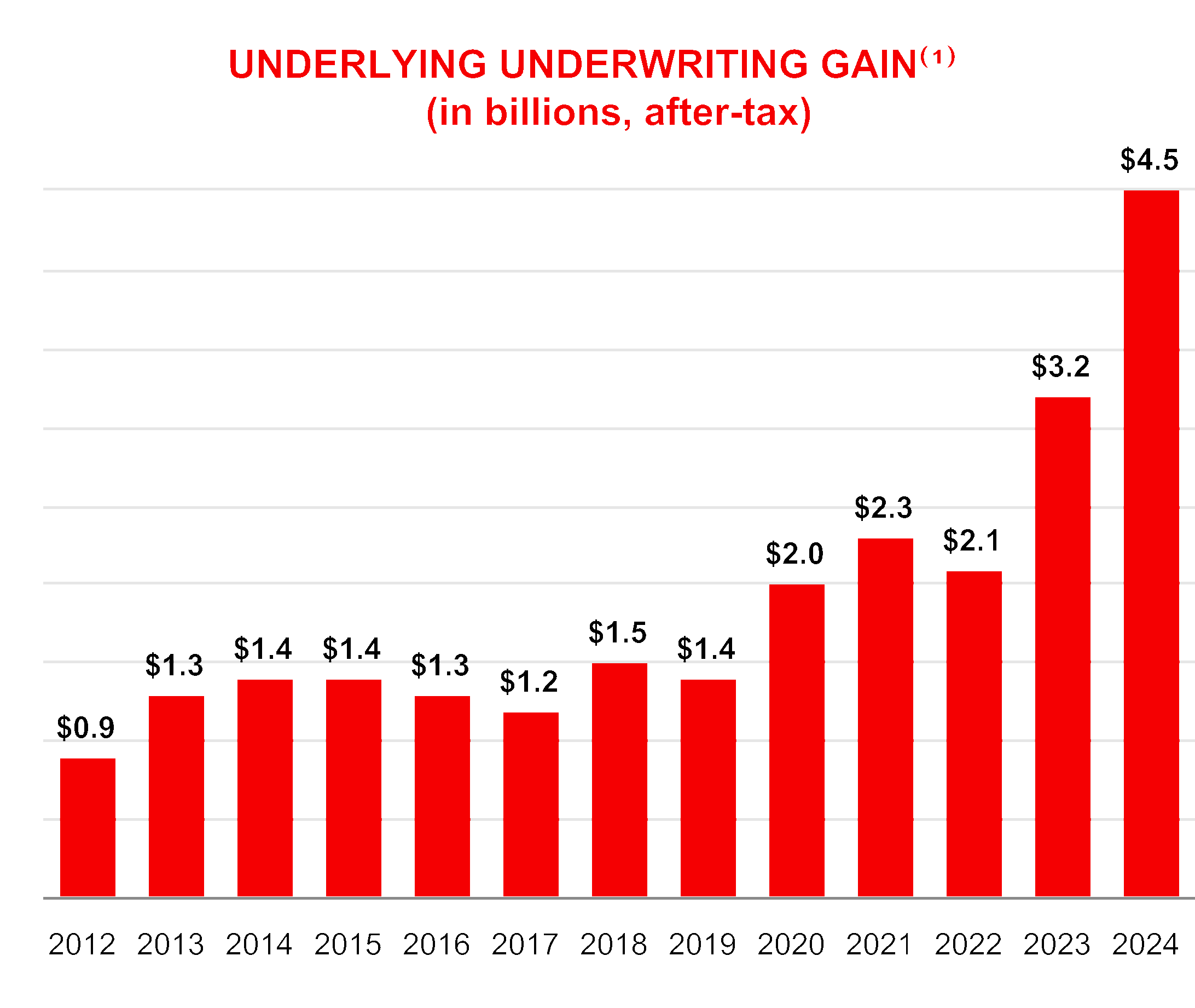
2025 Proxy Statement | The Travelers Companies, Inc.  | 37 |
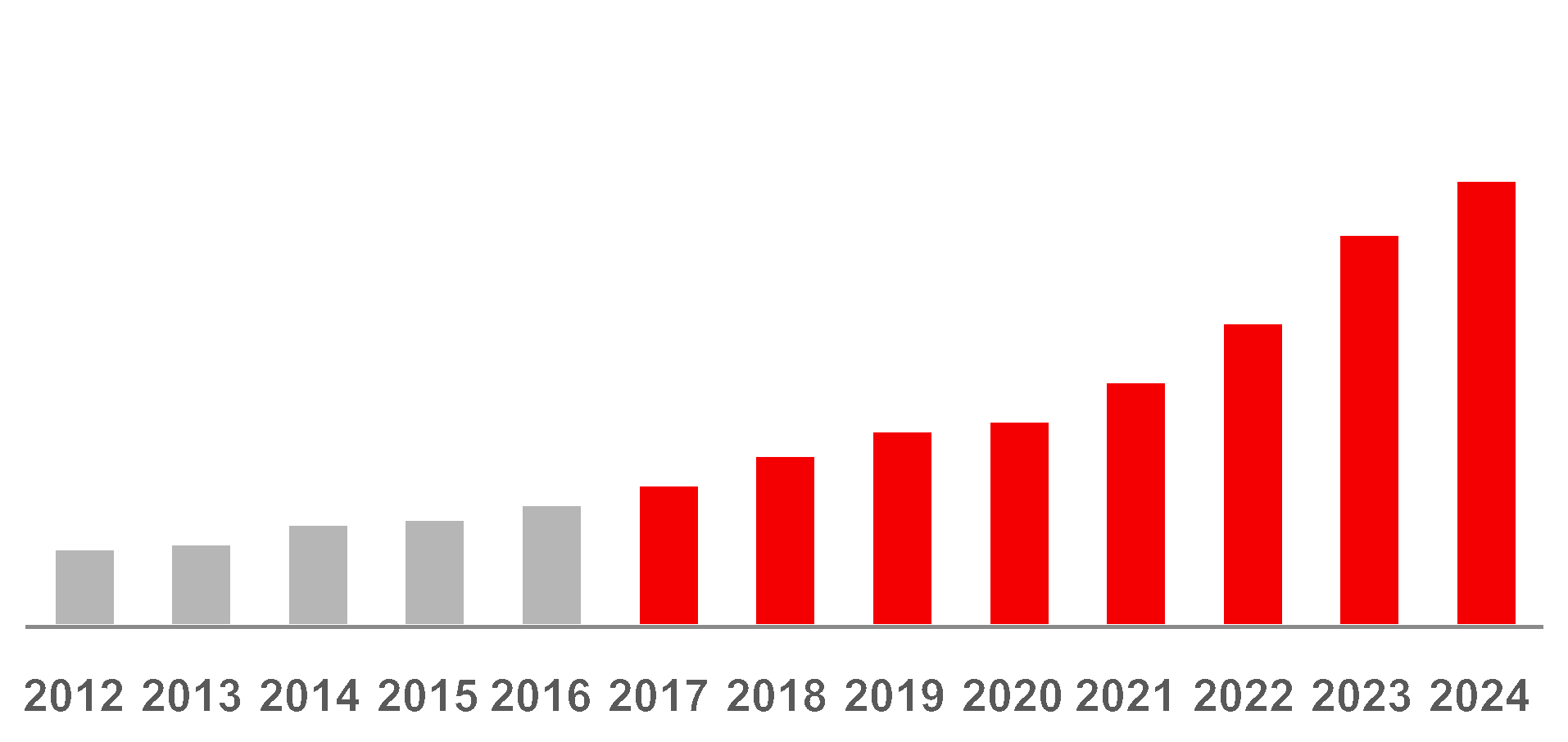


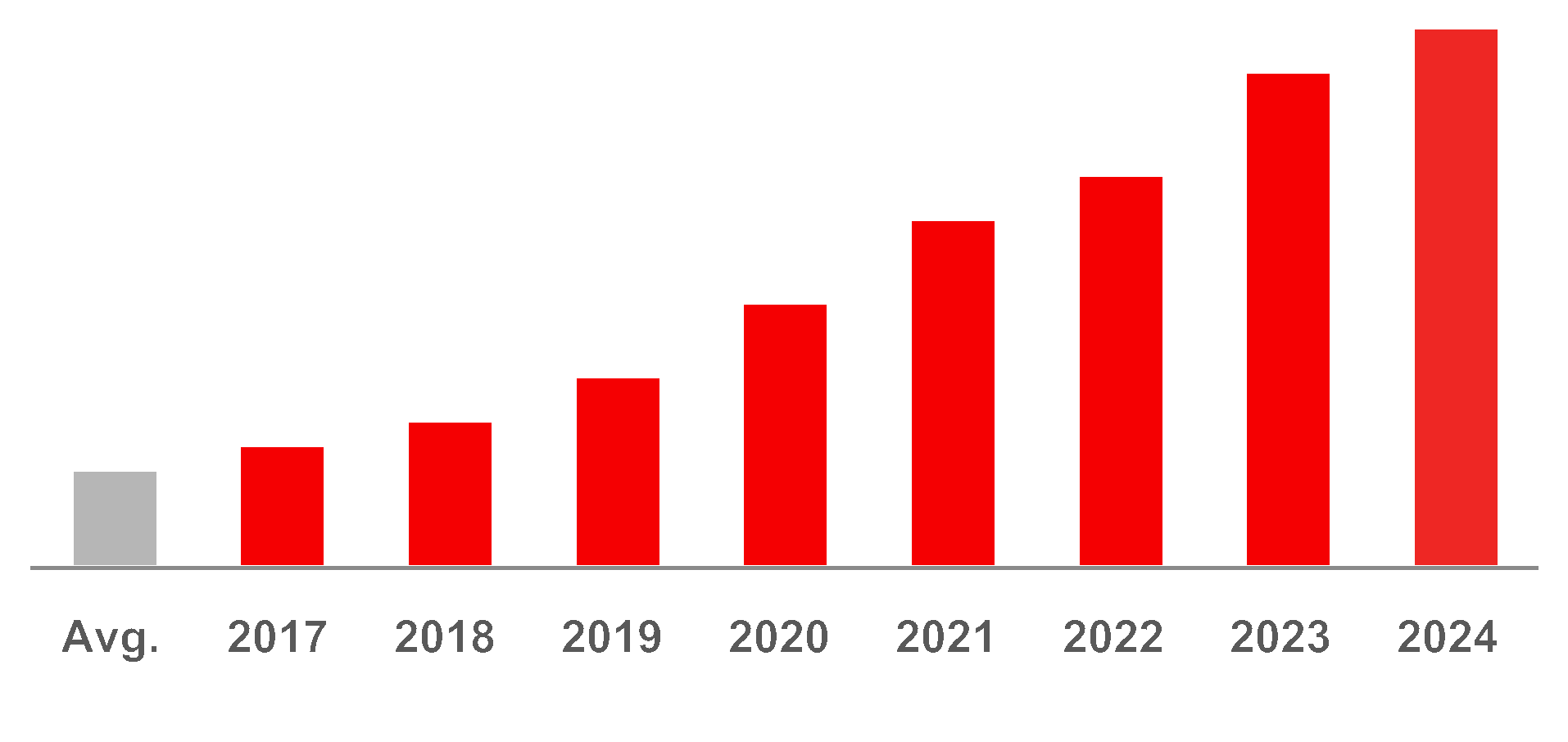

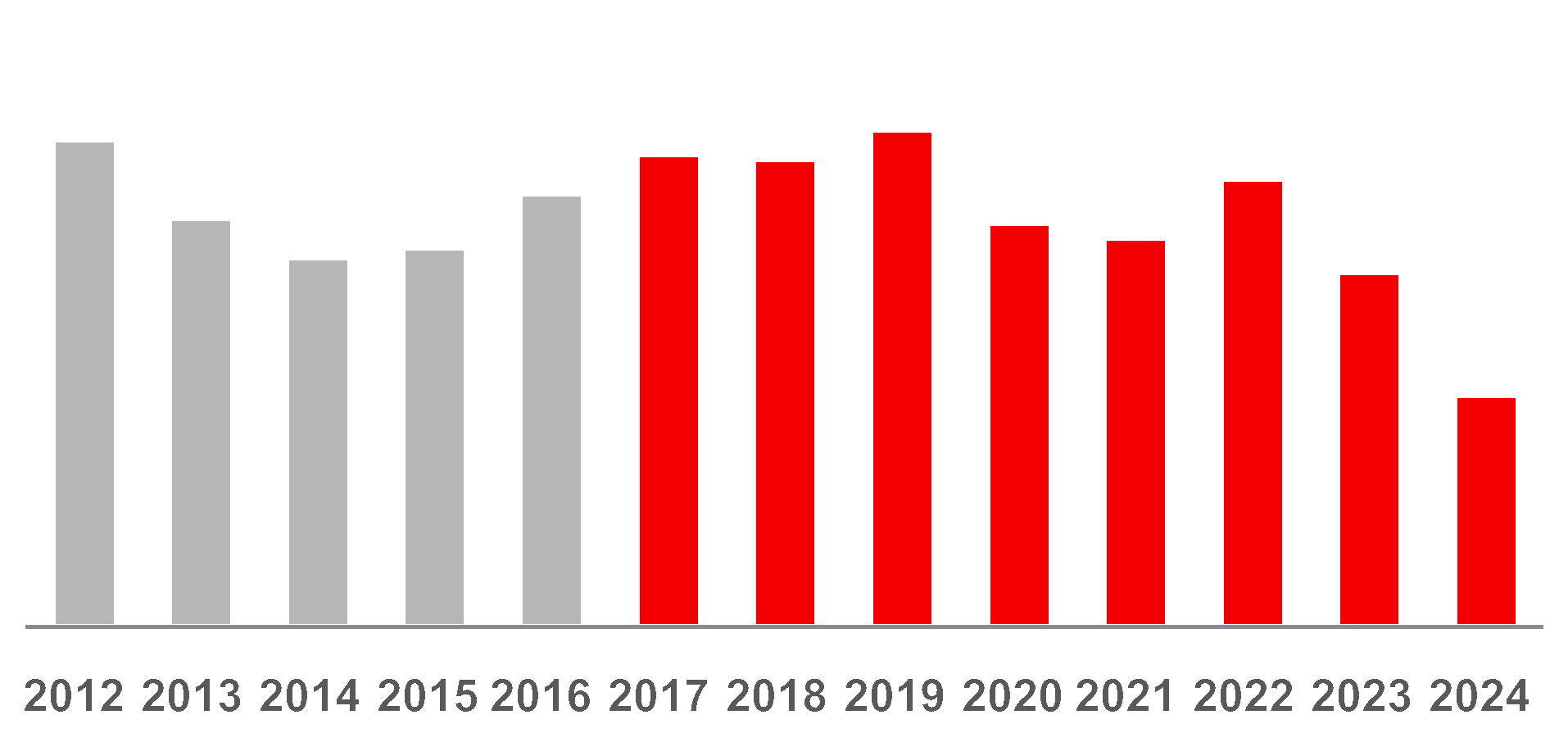

ACCELERATING NET WRITTEN PREMIUM GROWTH | CONSISTENTLY STRONG UNDERLYING PROFITABILITY(3)(4) |
IMPROVING EXPENSE RATIO | HIGHER UNDERLYING UNDERWRITING INCOME (AFTER-TAX)(4) |
HIGHER CASH FLOW FROM OPERATIONS | GROWING INVESTED ASSETS(5) |
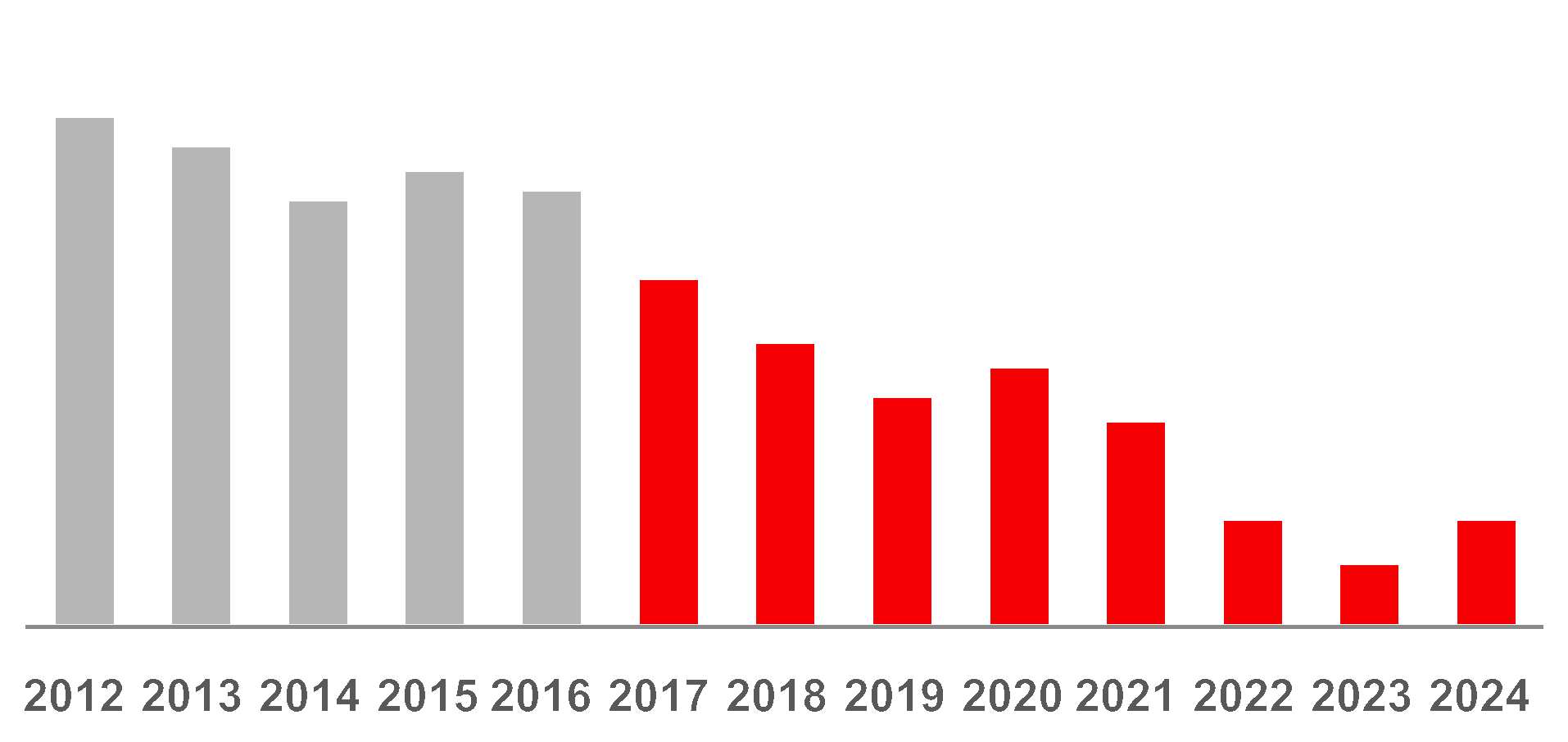


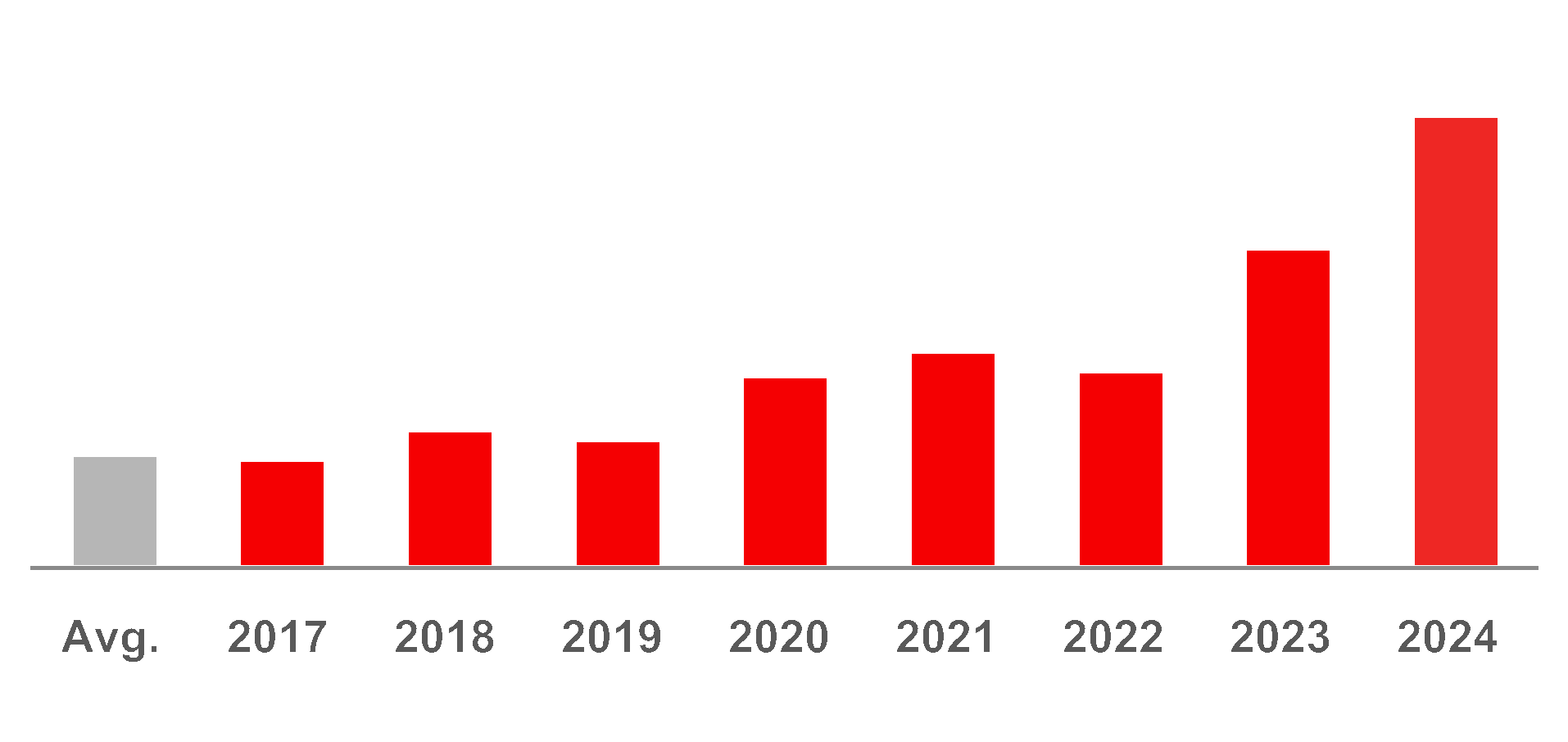

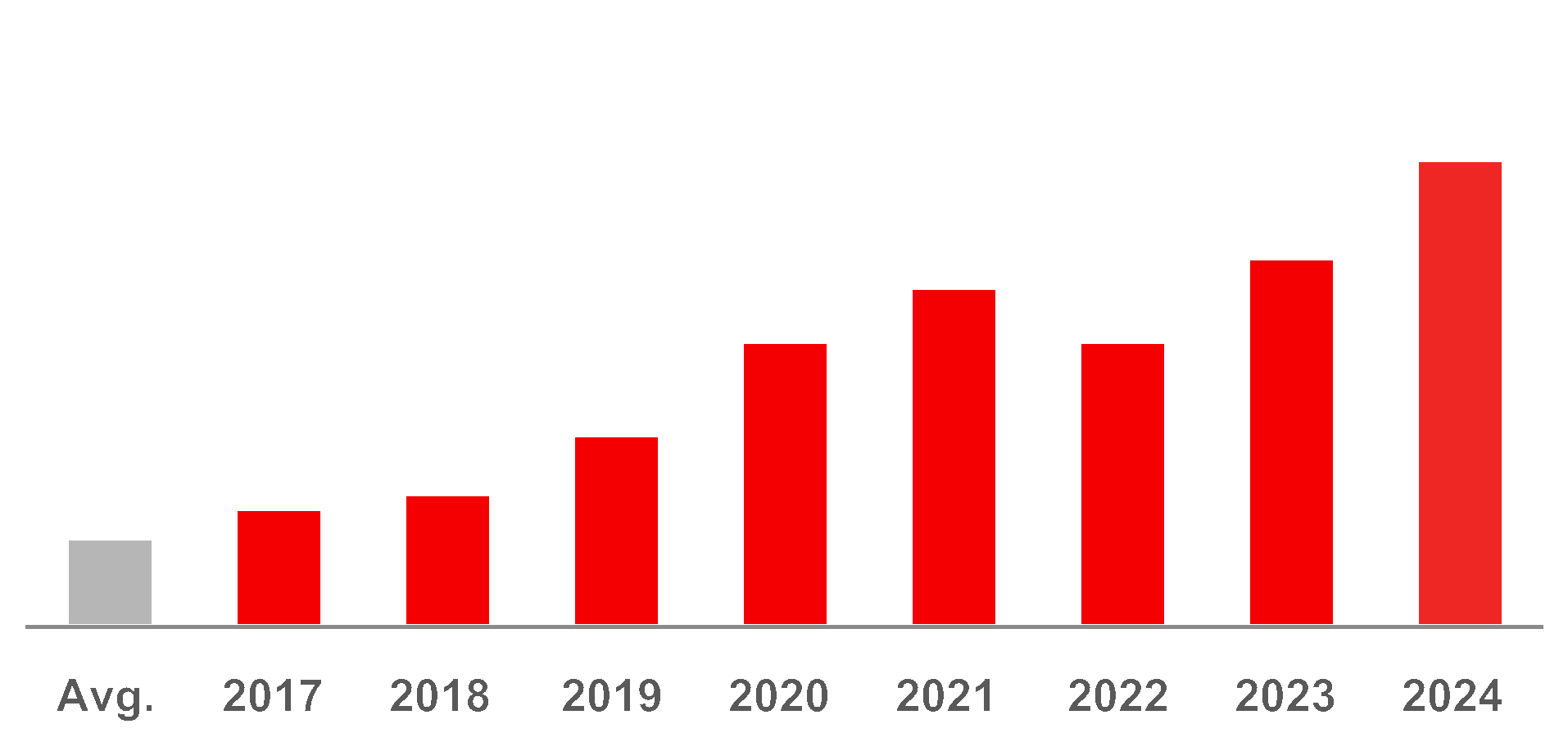

38 | The Travelers Companies, Inc. | 2025 Proxy Statement  |
•Our 2024 return on equity of 19.2% substantially exceeded the average return on equity for the domestic property and casualty industry in 2024 of approximately 13.3%, as estimated by Conning, Inc., a global investment management firm. For 2024, our return on equity comfortably covered our cost of equity and exceeded the average 10-year treasury by approximately 1,500 basis points. •Our average return on equity over the past decade of 12.5% exceeded the average return on equity for the domestic property and casualty industry of 7.5% and the average return on equity for the property and casualty companies in our Compensation Comparison Group of 11%. We have posted a double-digit return on equity in every year over the last decade, except for 2017, a difficult catastrophe year for the industry (with three hurricanes and wildfires in California), in which we posted a 9% return on equity. In every one of those years we comfortably covered our cost of equity. In addition, over the past decade, our average return on equity has exceeded the average 10-year treasury by an average of approximately 1,000 basis points. •Our average return on equity over the past decade has been accompanied by significantly less volatility as compared to the average volatility for the property and casualty insurers who are members of our Compensation Comparison Group. We believe that our performance over time demonstrates the value of our competitive advantages and the discipline with which we run our business. |
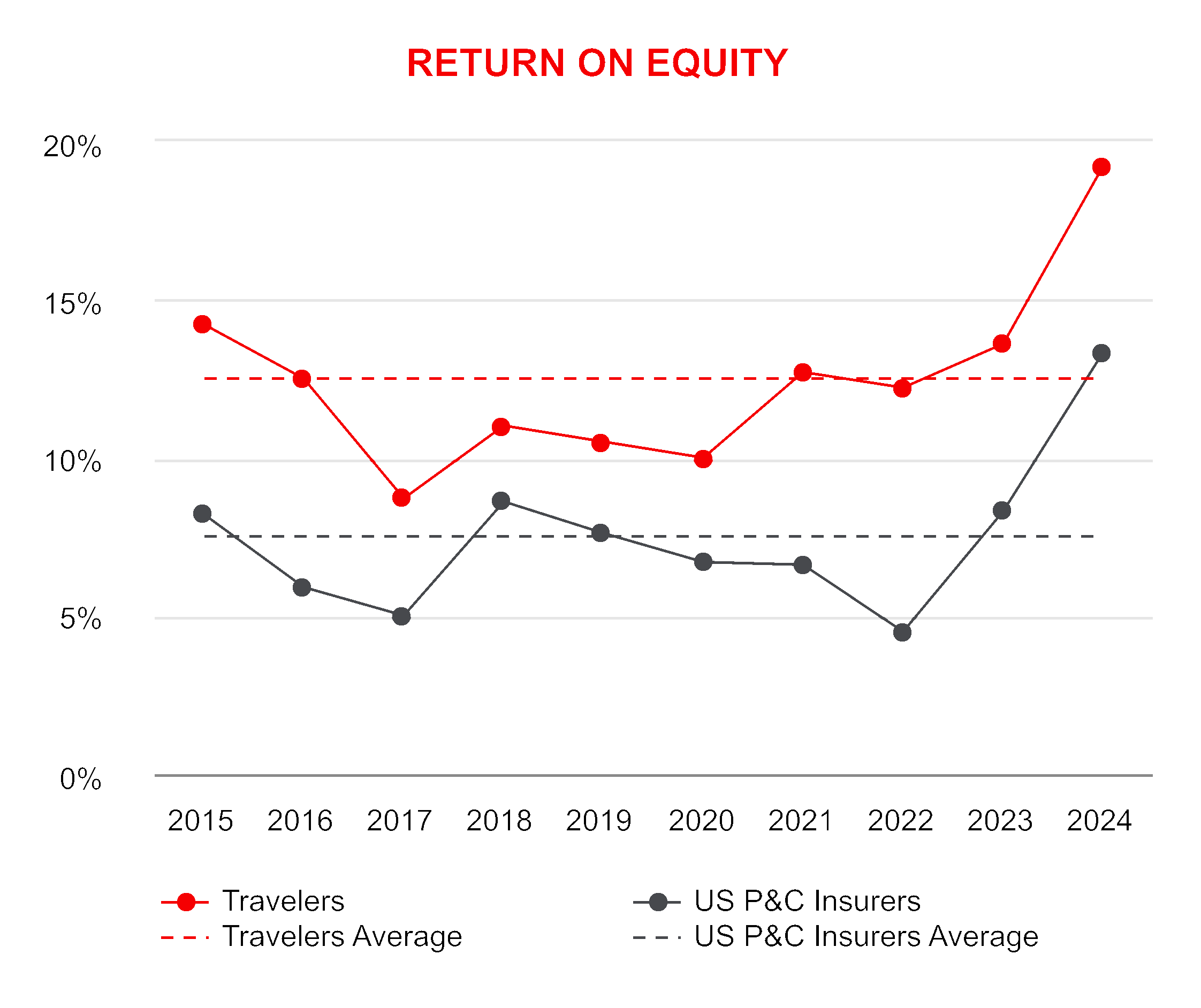
(1) 2024 Forecast: © 2025 Conning, Inc., as published in Conning’s Property- Casualty Forecast & Analysis by Line of Insurance, 2024 Q4 edition. Used with permission. Historical data: © 2025 S&P Global Market Intelligence LLC. Used with permission. |
2025 Proxy Statement | The Travelers Companies, Inc.  | 39 |
•During 2024, our book value per share and adjusted book value per share each increased by 13%, while, at the same time, we continued to make strategic investments in our business and to return a significant amount of excess capital to our shareholders through dividends and share repurchases. •Over the last 10 years, the compound annual growth rate of our book value per share was 5% and the compound annual growth rate of our adjusted book value per share was 7%. |
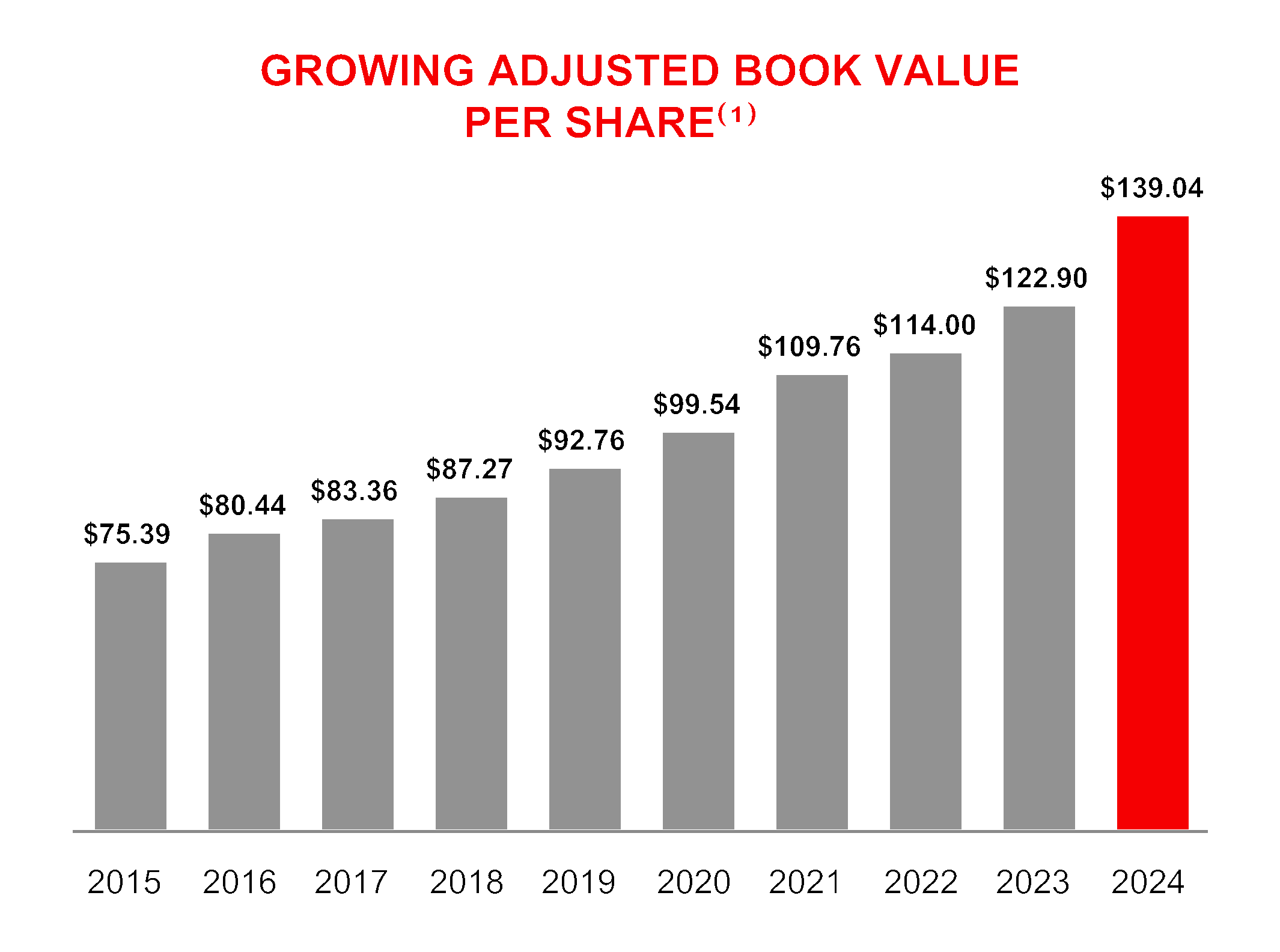
(1) Excludes net unrealized investment gains (losses), net of tax, included in shareholders' equity. |
•During 2024, we returned more than $2.1 billion in capital to shareholders through share repurchases of $1.1 billion and dividends of $1.0 billion. •Over the last 10 years, we have increased our dividend each year and increased dividends per share at an average annual rate of 7%. •Since we began our current share repurchase program in 2006, we have returned approximately $57 billion of excess capital to shareholders through dividends and share repurchases (at an average price per share of $74.97). |
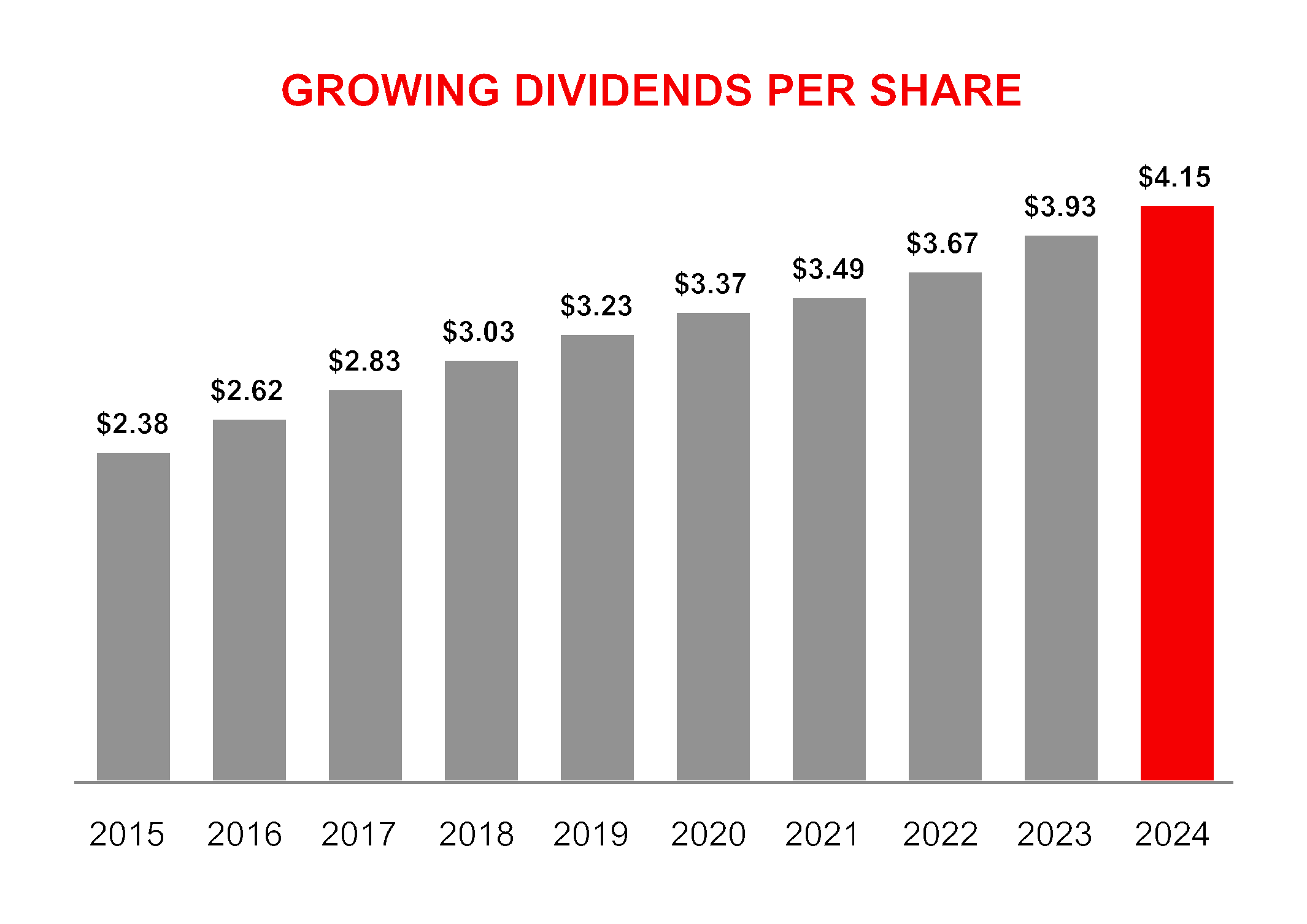
40 | The Travelers Companies, Inc. | 2025 Proxy Statement  |
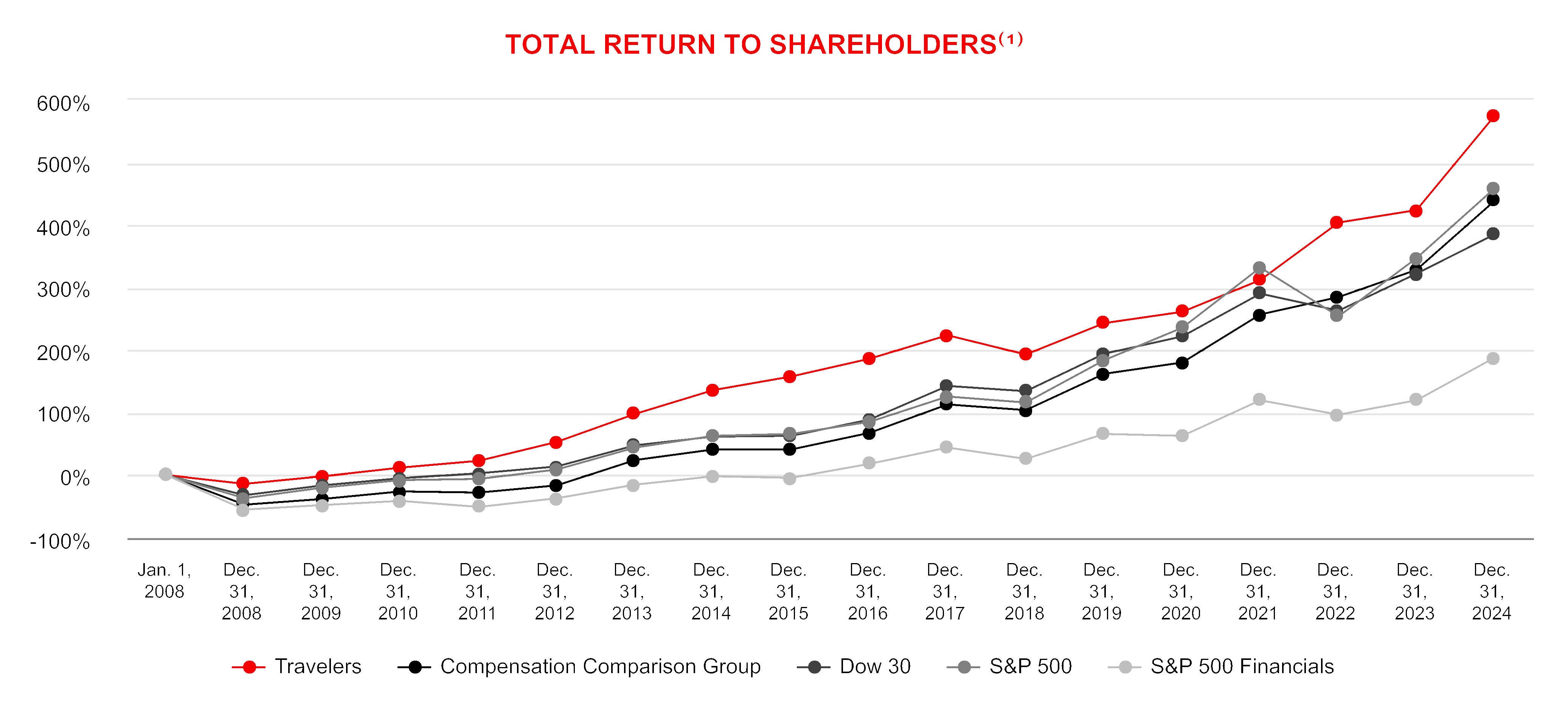
(1) Represents the change in stock price plus the cumulative amount of dividends, assuming dividend reinvestment. For each year on the chart, total return is calculated with January 1, 2008 as the starting point and December 31 of the relevant year as the ending point. © Bloomberg Finance L.P. Used with permission of Bloomberg. |
2025 Proxy Statement | The Travelers Companies, Inc.  | 41 |
Pay-for-Performance Philosophy |
Consistent with our longstanding pay-for-performance philosophy, the Compensation Committee believes that: |  In addition, to a greater extent than many of the companies included in our Compensation Comparison Group, due to the absence of time- based restricted stock in our ongoing program, the ultimate value of our named executive officer compensation is performance-based and is tied to operating results and increases in shareholder value over time. | |||||
 | When we generally exceed our performance goals and the named executive officers individually perform at superior levels in achieving that performance, total compensation for our executive officers should be set at superior levels compared to the compensation levels for equivalent positions in our Compensation Comparison Group. | |||||
 | When we do not generally exceed our performance goals or the named executive officers individually do not perform at superior levels, total compensation for these executives should be set at lower levels. | |||||
42 | The Travelers Companies, Inc. | 2025 Proxy Statement  |
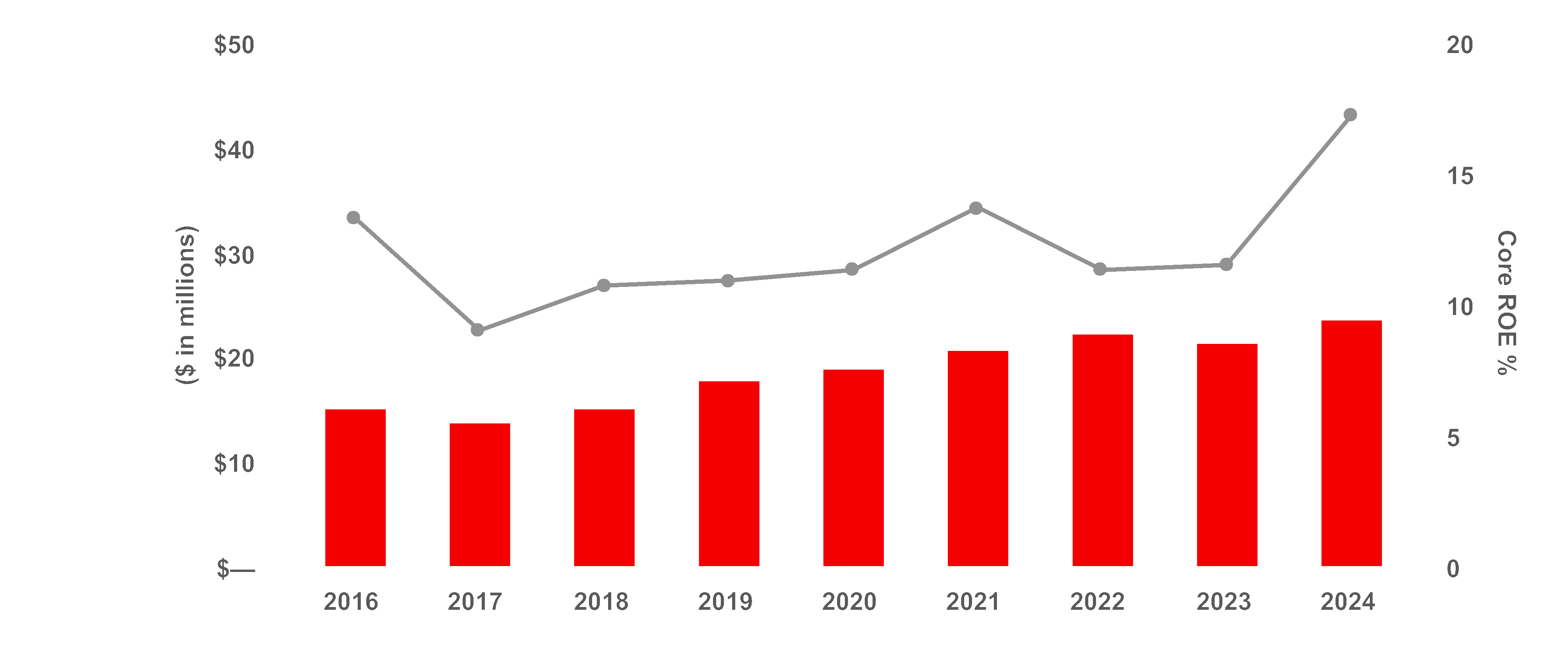
 | CEO Comp ($M) | $15.20 | $13.90 | $15.20 | $17.75 | $19.00 | $20.70 | $22.35 | $21.45 | $23.70 |
 | Core ROE | 13.3% | 9.0% | 10.7% | 10.9% | 11.3% | 13.7% | 11.3% | 11.5% | 17.2% |
ROE | 12.5% | 8.7% | 11.0% | 10.5% | 10.0% | 12.7% | 12.2% | 13.6% | 19.2% |
2025 Proxy Statement | The Travelers Companies, Inc.  | 43 |
Objectives of Our Executive Compensation Program |
Objective | |
Link compensation to the achievement of our short- and long-term financial and strategic objectives | The Compensation Committee believes that a properly structured compensation system should measure and reward performance on multiple bases. To ensure an appropriate degree of balance in the program, the compensation system is designed to measure short- and long-term financial and operating performance, the efficiency with which capital is employed in the business, the effective management of risk, the achievement of strategic initiatives and the individual performance of each executive. The Compensation Committee further believes that the most senior executives, who are responsible for the development and execution of our strategic and financial plans, should have the largest portion of their compensation tied to performance- based incentives, including stock-based compensation, the ultimate value of which is dependent on the performance of our stock price over time and on our three-year core return on equity. Accordingly, the proportion of total compensation that is performance-based increases with successively higher levels of responsibility. In addition, in evaluating the Company’s overall performance, the Compensation Committee considers that our business is subject to year-to-year volatility outside of management’s control, including natural and man-made catastrophic events. The Compensation Committee believes that, because the impact of catastrophes in any given year can produce significant volatility, the effective management of catastrophes can only be evaluated over a longer period of time. As a result, although the Compensation Committee believes that the impact of catastrophes on the Company’s financial results should be reflected in its executive compensation decisions, the Compensation Committee does not believe it is appropriate for compensation levels to be subject to as much volatility year-to-year as may be caused by actual catastrophes. |
Provide competitive compensation opportunities to attract, retain and motivate high- performing executive talent | Our overall compensation levels are designed to attract and retain the best executives in light of the competition for executive talent. We recognize that to continue to produce industry-leading results over time, we need to continuously cultivate that talent. We do so with competitive compensation programs that are designed to attract, motivate and retain our best people, development programs that foster personal and professional growth, and a focus on diversity and inclusion as a business imperative. In addition, the Compensation Committee believes that, when we generally exceed our performance goals and the named executive officers individually perform at superior levels in achieving that performance, total compensation for these executive officers should be set at superior levels compared to the compensation levels for equivalent positions in our Compensation Comparison Group. When we do not generally exceed our performance goals or the named executive officers individually do not perform at superior levels, total compensation for these executives should be set at lower levels. The Compensation Committee may also consider other relevant facts and circumstances in awarding compensation in order to attract, retain and motivate high-performing talent. |
44 | The Travelers Companies, Inc. | 2025 Proxy Statement  |
Objective | |
Align the interests of management and shareholders by paying a substantial portion of total compensation in stock-based incentives and ensuring that executives accumulate meaningful stock ownership stakes over their tenure | The Compensation Committee believes that the interests of executives and shareholders should be aligned. Accordingly, a significant portion of the total compensation for the named executive officers is in the form of stock-based compensation. The components of the annual stock-based compensation granted to the named executive officers in 2025 and 2024 were stock options and performance shares. Stock options provide value only if our stock appreciates, and performance shares vest only if a specified performance threshold is met. In addition, as discussed below, senior executives are expected to achieve specified stock ownership targets. Both the portion of total compensation attributable to stock-based programs and the expected level of executive stock ownership increase with successively higher levels of responsibility. |
Maximize, to the extent equitable and practicable, the financial efficiency of the overall compensation program | As part of the process of approving the initial design of incentive plans, or any subsequent modifications made to such plans, and determining awards under the plans, the Compensation Committee evaluates the aggregate economic costs and dilutive impact to shareholders of such compensation, the expected tax and accounting treatment and the impact on our financial results. The Compensation Committee attempts to balance the various financial implications of each program to ensure that the system is as efficient as possible and that unnecessary costs are avoided. |
Reflect established and evolving corporate governance standards | The Compensation Committee, with the assistance of our Human Resources Department and the Compensation Committee’s independent compensation consultant, stays abreast of current and developing corporate governance standards and trends with respect to executive compensation and adjusts the various elements of our executive compensation program, from time to time, as it deems appropriate. |
 What We DO |  What We DO NOT Do | |
Provide for a cap on the maximum cash bonus  opportunity with regard to our Chief Executive Officer and, starting with annual cash bonuses to be awarded in 2026 for performance in 2025, all of our other named executive officers Maintain a robust share ownership requirement  Maintain clawback policies giving us the ability to  recover incentive awards from our executive officers Prohibit hedging transactions as specified in our  securities trading policy Prohibit pledging shares without the consent of the  Company (no pledges have been made) Engage in extensive outreach and maintain a regular  dialogue with shareholders relating to the Company’s governance, compensation and sustainability practices Engage an independent consultant that works directly  for the Compensation Committee and does not work for management | No excise tax “gross-up” payments in the event of a  change in control No tax “gross-up” payments on perquisites for named  executive officers No repricing of stock options and no buy-out of  underwater options No excessive or unusual perquisites  No dividends or dividend equivalents paid on  unvested performance shares No above-market returns provided for in deferred  compensation plans No guaranteed equity awards or bonuses for named  executive officers | |
2025 Proxy Statement | The Travelers Companies, Inc.  | 45 |
Compensation Elements and Decisions |
6% Base Salary | 30% Annual Cash Bonus | 38% Performance Shares | 26% Stock Options |
Performance-Based Pay 94% | |||
12% Base Salary | 45% Annual Cash Bonus | 26% Performance Shares | 17% Stock Options |
Performance-Based Pay 88% | |||
CASH-BASED COMPENSATION | STOCK-BASED COMPENSATION | |||||
The Compensation Committee has determined that it is appropriate for the allocation of compensation between performance-based annual cash bonus and stock-based long-term incentives to be somewhat more heavily weighted towards cash bonus as compared to our Compensation Comparison Group. The Compensation Committee believes that this allocation is appropriate in light of the fact that a higher percentage of the named executive officers’ total compensation (and total direct compensation) is performance-based as compared to the peer average and peer median of the Compensation Comparison Group. In particular, unlike a number of other companies in our Compensation Comparison Group that grant time-vesting restricted stock, annual equity awards made to the named executive officers are typically all performance-based. | Annual awards of stock-based compensation are typically in the form of performance shares and stock options. Because our performance shares only vest if specified performance thresholds are met, and because stock options provide value only if our stock price appreciates, the Compensation Committee believes that such compensation is all performance-based; that is, the compensation typically awarded annually to our Chief Executive Officer and other named executive officers generally does not include awards that are earned solely due to the passage of time without regard to performance. | |||||
46 | The Travelers Companies, Inc. | 2025 Proxy Statement  |
6% Base Salary | 30% Annual Cash Bonus | 38% Performance Shares | 26% Stock Options |
Performance-Based Pay 94% | |||
7% Base Salary | 10% Restricted Stock | 25% Bonus | 45% Performance Shares/units | 13% Stock Options |
Performance-Based Pay 83% | ||||
METRICS The Compensation Committee’s philosophy is to generally set base salary for executive officers at a level that is intended to be on average at or near the 50th percentile for equivalent positions in our Compensation Comparison Group. Individual salaries may range above or below the median based on a variety of factors, including the potential impact of the executive’s role at the Company, the terms of the executive’s employment agreement, if any, the tenure and experience the executive brings to the position and the performance and potential of the executive in his or her role. Because salaries for executive officers are typically changed infrequently, at the time the Compensation Committee increases the salaries of executives, such salaries on average may initially, and for a period of time following such increases, be higher than the 50th percentile of our Compensation Comparison Group on the basis that over time the average is expected to be at, or near, approximately the 50th percentile. Base salaries are reviewed annually, and adjustments are made from time to time as the Compensation Committee deems appropriate to recognize performance, changes in duties and/or changes in the competitive marketplace. |  Link To Strategy The Compensation Committee’s base salary positioning supports the attraction and retention of high-quality talent, ensures an affordable overall cost structure and mitigates excessive risk taking. | ||||
2025 Proxy Statement | The Travelers Companies, Inc.  | 47 |
48 | The Travelers Companies, Inc. | 2025 Proxy Statement  |
METRICS The Compensation Committee evaluates a broad range of financial and non-financial metrics in awarding performance- based incentives each year. The Compensation Committee believes that a formulaic approach to the determination of performance-based compensation could result in unintended consequences and is not an appropriate substitute for the Compensation Committee’s informed and thorough deliberation and the application of its reasoned business judgment. The Compensation Committee believes that there is no substitute for understanding the Company’s results and how those results were achieved. The application of a formulaic approach could be particularly damaging in the property and casualty industry, where prudent risk management and long-term thinking are critically important, and where the impact of executive decisions are only evident over longer periods of time. The Compensation Committee believes that its current approach allows it to appropriately assess the quality of performance results and ensures that executives are not unduly rewarded, or disadvantaged, based purely on the application of a mechanical formula. CORE RETURN ON EQUITY Core return on equity is a principal factor in the Compensation Committee’s evaluation of the Company’s performance. The Compensation Committee believes that core return on equity should not be viewed as a single metric. Rather, by being a function of both core income and shareholders’ equity (excluding unrealized gains and losses on investments), core return on equity is a function of both the Company’s income statement which reflects the Company’s top- and bottom-line performance for the periods presented, and balance sheet, which reflects the Company’s financial position at a point in time and includes the Company’s cumulative performance over time and the execution of its business and capital management strategies. When evaluating core return on equity, the Compensation Committee considers: •the Company’s cost of equity; •recent and historical trends with respect to interest rates; •recent and historical trends with respect to core return on equity for the Company; •recent and historical trends with respect to return on equity for the domestic property and casualty insurance industry, including the industry peers included in the Compensation Comparison Group; and •the significantly lower level of volatility with respect to the Company’s return on equity relative to the average volatility of the industry peers included in the Compensation Comparison Group. ADDITIONAL METRICS The Compensation Committee also evaluates the Company’s performance with respect to a wide range of other financial metrics included in the financial plan approved by the Board prior to the beginning of the year, including: •Core income and core income per diluted share, and the metrics that contribute to those results, such as: •earned premiums; •investment income; •insurance losses; and •expense and capital management. In evaluating performance against the metrics, however, the Compensation Committee does not use a formula or pre- determined weighting, and no one metric is individually material other than core return on equity and core income. In light of the Company’s objective to create shareholder value by generating significant earnings and taking a balanced approach to capital management, the Compensation Committee also reviews per share growth in book value and adjusted book value over time. However, because (1) book value can be volatile due to, among other things, the impact of changing interest rates on the fair value of the Company’s fixed-income investment portfolio, and (2) the Company’s capital management strategy also emphasizes returning excess capital to shareholders, the Compensation Committee does not set a specific target for per share growth in book value or adjusted book value. Further, while it evaluates changes in book value and adjusted book value in the context of overall results, the Compensation Committee does not believe such changes, by themselves, are always the most meaningful indicators of relative performance. | |||
 | Link To Strategy Senior executives, as well as other employees with management responsibility, are encouraged to focus on multiple performance objectives that are important for creating shareholder value, including the quality and profitability of our underwriting and investment decisions, the pricing of our policies, the effectiveness of our claims management and the efficacy of our capital and risk management. In addition, senior executives are encouraged to focus on executing the Company’s ambitious innovation agenda to position the Company for continued success. | ||
2025 Proxy Statement | The Travelers Companies, Inc.  | 49 |














50 | The Travelers Companies, Inc. | 2025 Proxy Statement  |
2025 Proxy Statement | The Travelers Companies, Inc.  | 51 |
FACTORS CONSIDERED BY THE COMPENSATION COMMITTEE WHEN ESTABLISHING TARGETS FOR 2024 For the reasons discussed above, the targets for 2024 for each of core return on equity and adjusted core return on equity did not include any prior year reserve development, either positive or negative. For 2023, core return on equity and adjusted core return on equity included 40 basis points and 150 basis points of positive prior year reserve development, respectively. | |||
CORE RETURN ON EQUITY | ADJUSTED CORE RETURN ON EQUITY(2) |
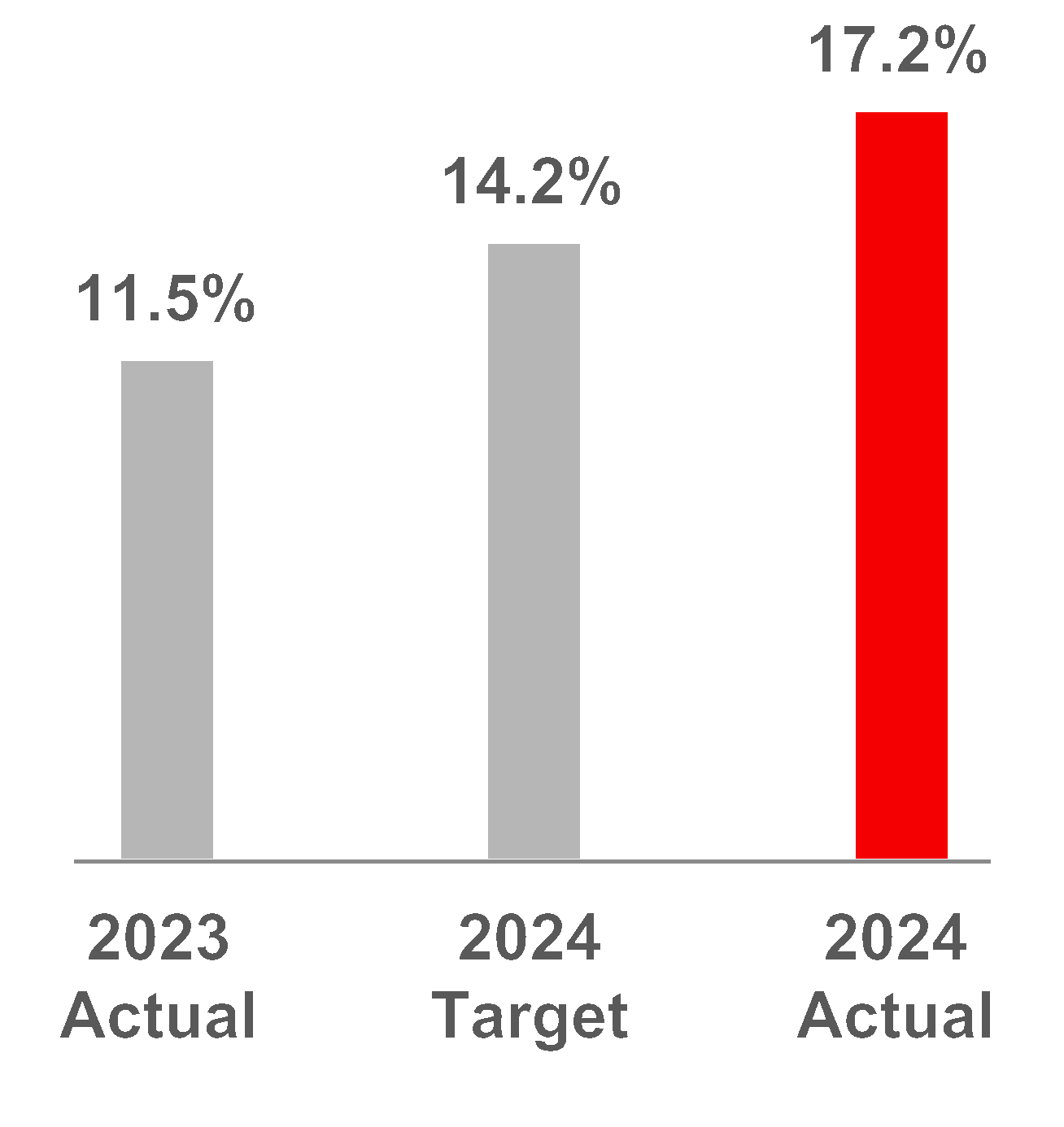
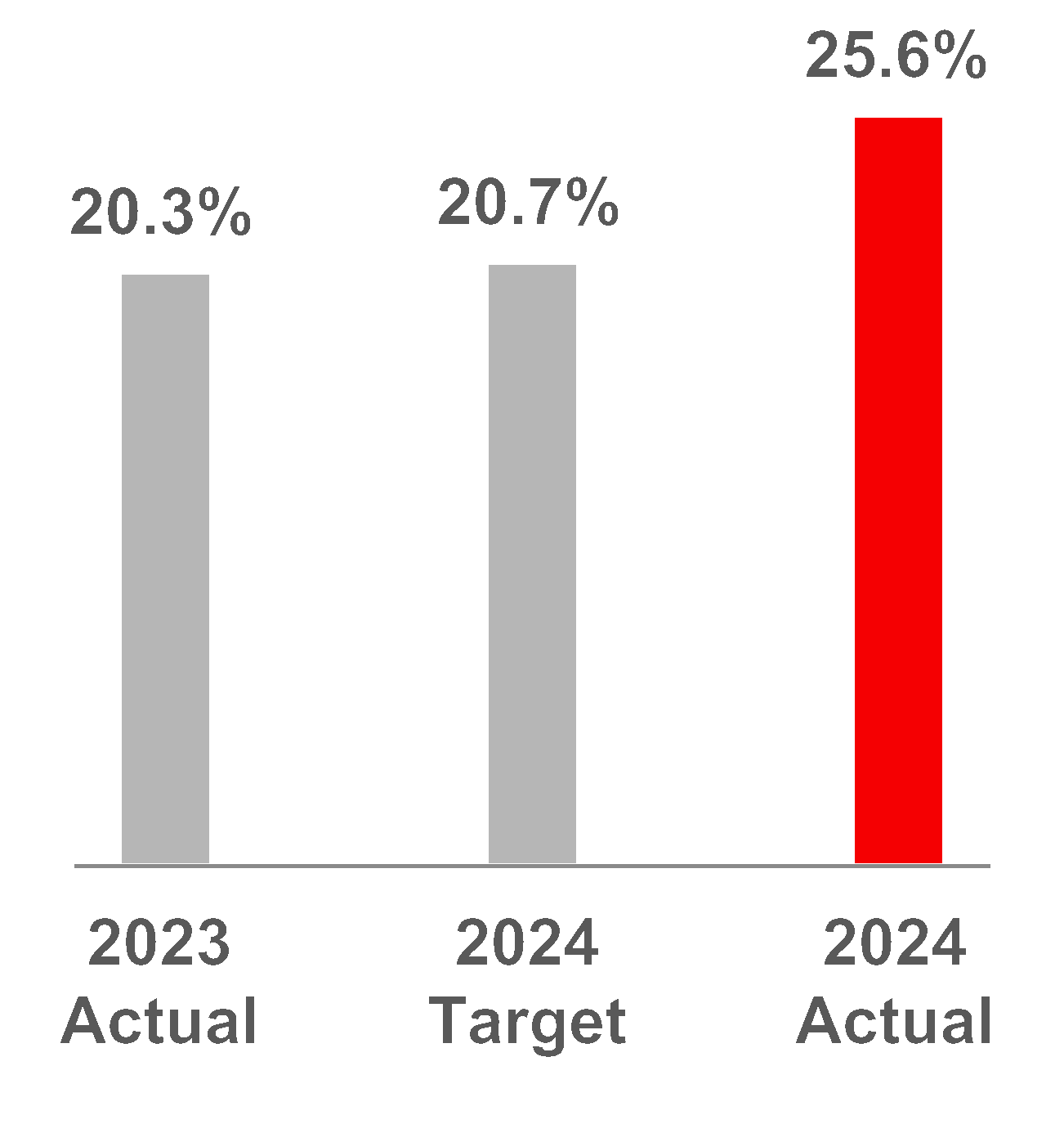
52 | The Travelers Companies, Inc. | 2025 Proxy Statement  |
FACTORS CONSIDERED BY THE COMPENSATION COMMITTEE WHEN ESTABLISHING TARGETS FOR 2024 For the reasons discussed above, the targets for 2024 for each of core income, core income per diluted share and adjusted core income did not include any prior year reserve development, either positive or negative. For 2023, core income, core income per diluted share and adjusted core income included $113 million, $0.48 and $411 million of positive prior year reserve development, respectively. | |||
CORE INCOME | CORE INCOME PER DILUTED SHARE | ADJUSTED CORE INCOME(2) |
in billions | in billions |
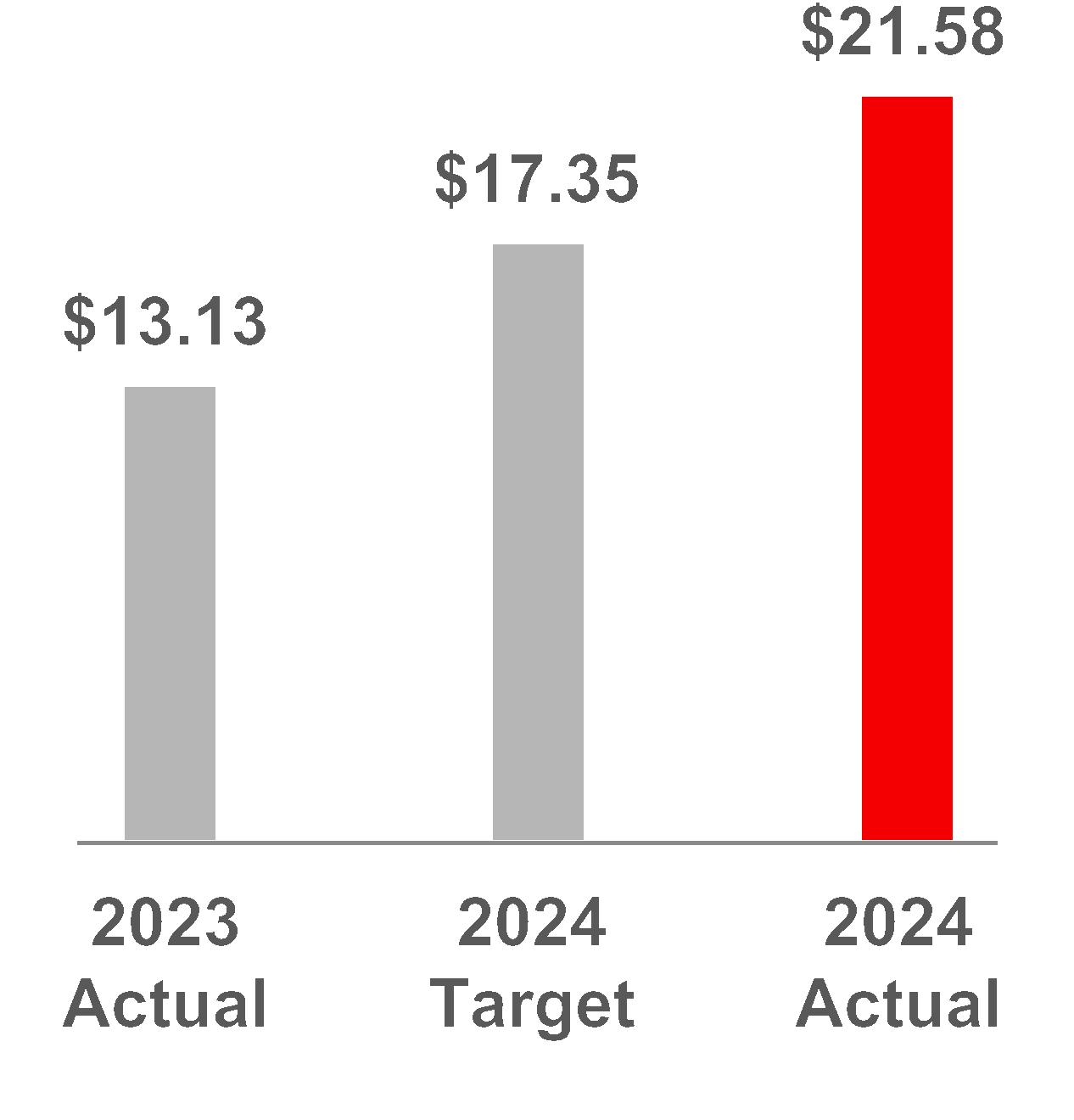
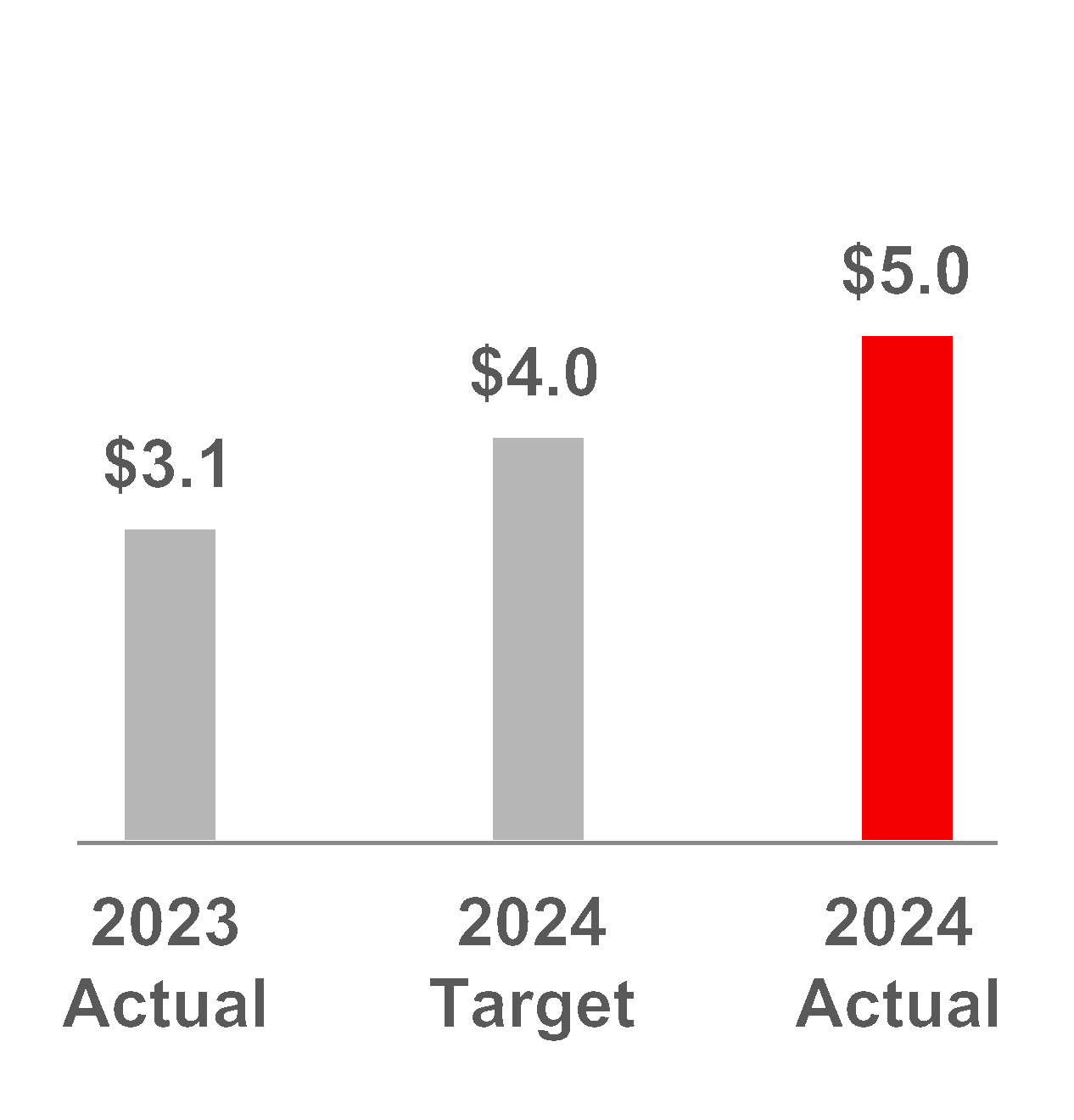
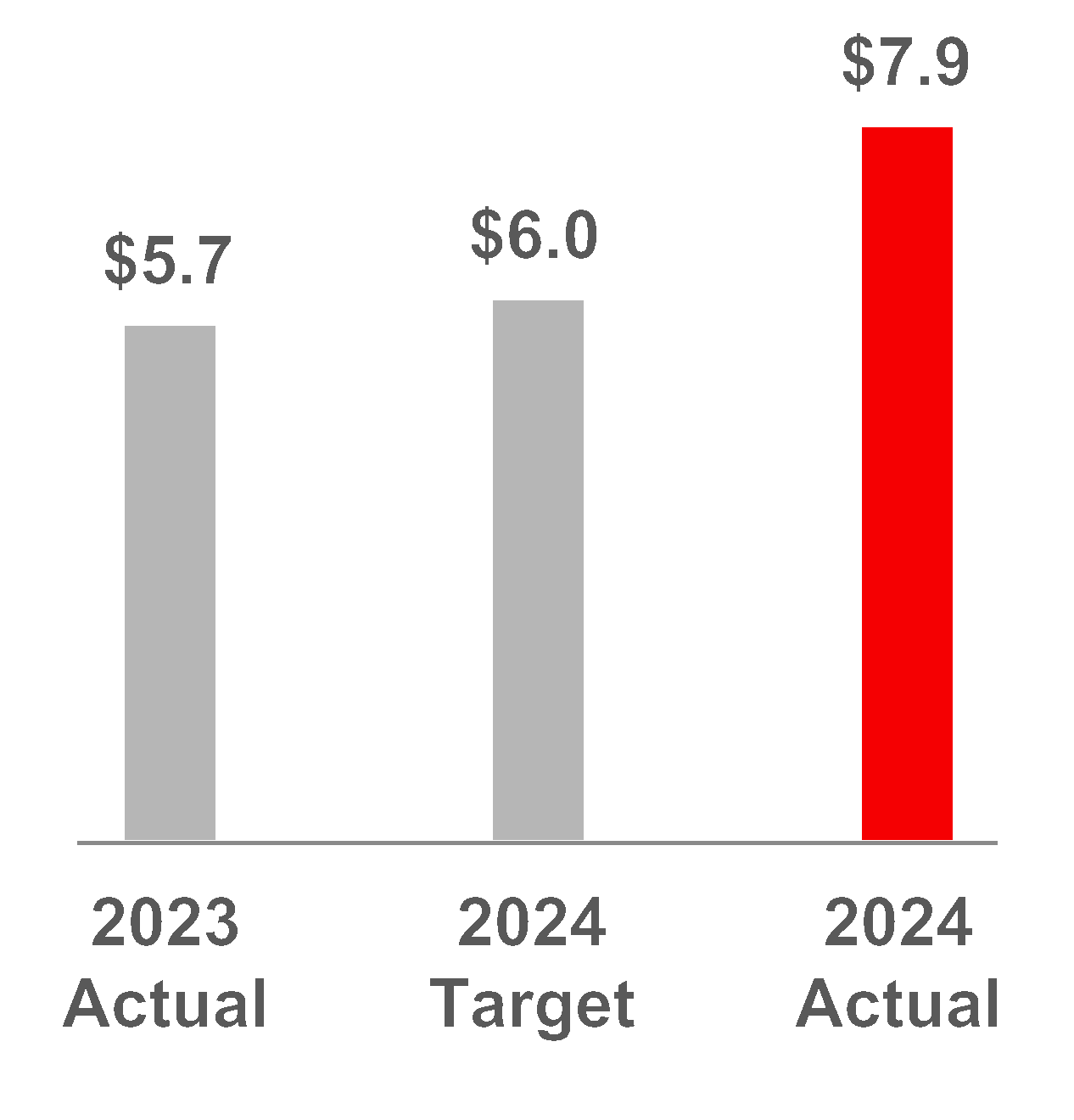
Annual cash bonus | Change in annual cash bonus compared to 2023 | |
Mr. Schnitzer | $7.0 million | Increased by 17%. |
Mr. Frey | $2.7 million | Increased by an average of 18%. |
Mr. Kess | $3.5 million | |
Mr. Toczydlowski | $3.4 million | Increased by an average of 25%. |
Mr. Klein | $2.9 million |
2025 Proxy Statement | The Travelers Companies, Inc.  | 53 |
METRICS In determining the size of the total long-term incentive opportunity, the Compensation Committee considers a number of factors, including the factors applied with regard to the determination of the annual cash bonus award. Once the performance share award has been granted, the number of shares that a named executive officer will receive upon vesting, if any, depends on the Company’s attainment of specific targets. These targets, which are described on page 56, are specified at the time the awards are granted and, unlike the practice of most companies, disclosed in advance to shareholders to enable a full evaluation of the rigor of our performance goals and how the performance schedule compares to our cost of equity. In addition, starting with grants of performance shares made in 2025, the vesting of performance shares will be subject to a relative total shareholder return modifier that can cause actual vesting to be 20 percentage points higher or lower, subject to an overall maximum payout of 200 percent. The value provided by the stock options is determined solely on the appreciation of the stock price subsequent to the grant of the award. |  Link To Strategy Long-term stock-based incentives ensure that our executive officers have a continuing stake in our long-term success and manage the business with a long-term, risk-adjusted perspective. In addition, senior executives are encouraged to focus on executing the Company’s ambitious innovation agenda to position the Company for continued success. | ||||
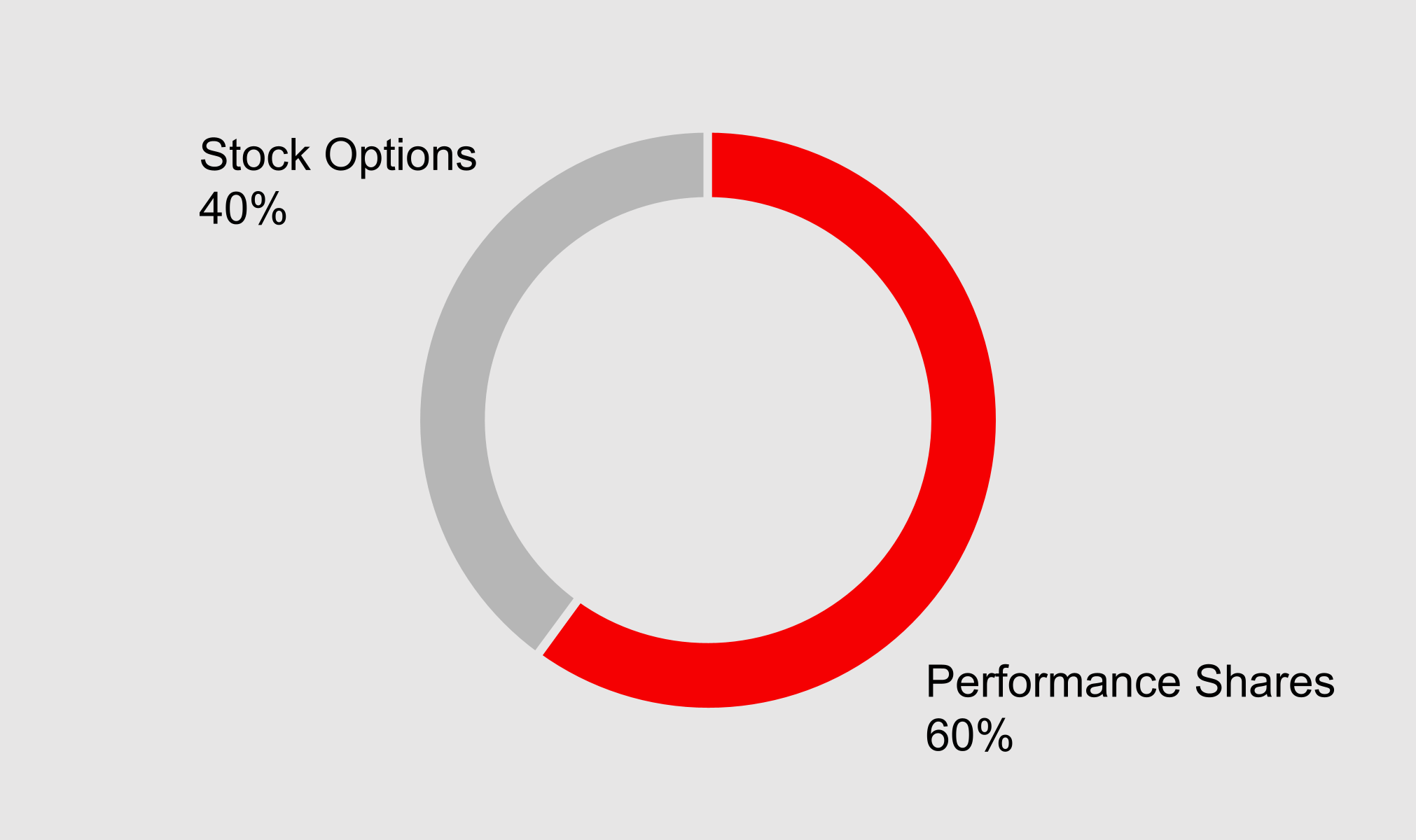
These allocations are intended to result in a mix of annual long-term incentives that is sufficiently performance-based and will result in: •a large component of total compensation being tied to the achievement of specific, multi-year operating performance objectives and changes in shareholder value (performance shares); and •an appropriate portion being tied solely to changes in shareholder value (stock options). | ||
54 | The Travelers Companies, Inc. | 2025 Proxy Statement  |
Stock-based long-term incentive award grant date value | Change in grant date value compared to awards granted in 2024 | |
Mr. Schnitzer | $15.25 million | Increased by $1.25 million. |
Messrs. Frey and Kess | 3 times base salary | Consistent with the prior year. |
Messrs. Toczydlowski and Klein | 4 times base salary | Consistent with the prior year. |
Stock-based long-term incentive award grant date value | Change in grant date value compared to awards granted in 2023 | |
Mr. Schnitzer | $14.0 million | Decreased by $250,000. |
Mr. Frey | $2.5 million | The annual equity award for Mr. Frey was increased by $100,000, to increase his total direct compensation relative to his peers at the insurance companies included in the Compensation Comparison Group. |
Mr. Kess | 3.0 times base salary | Consistent with the prior year. |
Messrs. Toczydlowski and Klein | 4.0 times base salary | Consistent with the prior year. |
2025 Proxy Statement | The Travelers Companies, Inc.  | 55 |
56 | The Travelers Companies, Inc. | 2025 Proxy Statement  |
Performance Period Return on Equity for Performance Shares | |||
Vesting Percentage | Granted in 2024 | Granted in 2025 | |
Threshold | 0% | <8.00% | <8.75% |
50% | 8.00% | 8.75% | |
75% | 9.50% | 10.25% | |
100% | 11.00% | 11.75% | |
120% | 11.50% | 12.25% | |
140% | 12.50% | 13.25% | |
160% | 13.00% | 13.75% | |
180% | 14.50% | 15.25% | |
Maximum | 200% | 16.00% | 16.75% |
2025 Proxy Statement | The Travelers Companies, Inc.  | 57 |
Awards earned based on Performance Period Return on Equity* | ‘+/- | rTSR Modifier* | = | Final Payout |
Company rTSR Performance - Percentile | rTSR Modifier levels* |
Highest | ‘+20 percentage points (pp) |
90th | ‘+16 pp |
80th | ‘+12 pp |
70th | ‘ +8 pp |
60th | ‘ +4 pp |
50th | 0 |
40th | ‘ -4 pp |
30th | ‘ -8 pp |
20th | ‘ -12 pp |
10th | ‘ -16 pp |
Lowest | ‘ -20 pp |
58 | The Travelers Companies, Inc. | 2025 Proxy Statement  |
2025 Proxy Statement | The Travelers Companies, Inc.  | 59 |
60 | The Travelers Companies, Inc. | 2025 Proxy Statement  |
Additional Compensation Information |
Our Compensation Comparison Group includes: | ||
Key competitors in the property and casualty insurance industry — | General financial services and life and health insurance companies of relatively similar size and complexity — | |
•American International Group, Inc. (AIG) •Allstate Corporation (ALL) •Chubb Ltd. (CB) •Hartford Financial Services Group (HIG) •Progressive Corporation (PGR) | •Aflac (AFL) •American Express (AXP) •Bank of New York Mellon (BK) •Humana (HUM) | •Lincoln National (LNC) •Marsh & McLennan (MMC) •MetLife Inc. (MET) •Prudential Financial Inc. (PRU) |
We regard these companies as potential competition for executive talent. | ||
2025 Proxy Statement | The Travelers Companies, Inc.  | 61 |
62 | The Travelers Companies, Inc. | 2025 Proxy Statement  |
Rank | Target Stock Ownership Level |
CEO | 600% of base salary |
Other Named Executive Officers | 300% of base salary |
 What We Count Toward the Requirement |  What We DO NOT Count Toward the Requirement | |
Shares held directly by the executive  Shares held indirectly through our 401(k) Savings  Plan or deferred compensation plan | Unexercised stock options  Unvested performance shares  | |
The policy provides that executives who have not achieved these levels of stock ownership are expected to retain at least 50% of the shares acquired upon exercising stock options or upon the vesting of restricted stock, restricted stock units or performance shares (other than shares used to pay the exercise price of options and withholding taxes) until the requirements are met. |
2025 Proxy Statement | The Travelers Companies, Inc.  | 63 |
64 | The Travelers Companies, Inc. | 2025 Proxy Statement  |
Total Direct Compensation for 2022-2024 (Supplemental Table) |
Name and Principal Position | Year | Salary ($) | Bonus ($) | Equity Awards1 ($) | Total ($) | Increase/ (Decrease) from Prior Year (%) |
Alan D. Schnitzer Chairman and Chief Executive Officer | 2024 | 1,450,000 | 7,000,000 | 15,250,000 | 23,700,000 | 10 |
2023 | 1,450,000 | 6,000,000 | 14,000,000 | 21,450,000 | (4) | |
2022 | 1,300,000 | 6,800,000 | 14,250,000 | 22,350,000 | 8 | |
Daniel S. Frey Executive Vice President and Chief Financial Officer | 2024 | 800,000 | 2,700,000 | 2,500,000 | 6,000,000 | 8 |
2023 | 800,000 | 2,280,000 | 2,500,000 | 5,580,000 | — | |
2022 | 787,692 | 2,400,000 | 2,400,000 | 5,587,692 | 6 | |
Gregory C. Toczydlowski Executive Vice President and President, Business Insurance | 2024 | 850,000 | 3,350,000 | 3,400,000 | 7,600,000 | 9 |
2023 | 850,000 | 2,720,000 | 3,400,000 | 6,970,000 | (1) | |
2022 | 825,385 | 2,835,000 | 3,400,000 | 7,060,385 | 8 | |
Avrohom J. Kess Vice Chairman and Chief Legal Officer | 2024 | 950,000 | 3,500,000 | 2,850,000 | 7,300,000 | 8 |
2023 | 950,000 | 2,970,000 | 2,850,000 | 6,770,000 | (2) | |
2022 | 937,692 | 3,125,000 | 2,850,000 | 6,912,692 | 5 | |
Michael F. Klein Executive Vice President and President, Personal Insurance | 2024 | 800,000 | 2,900,000 | 3,200,000 | 6,900,000 | 10 |
2023 | 800,000 | 2,300,000 | 3,200,000 | 6,300,000 | (3) | |
2022 | 775,385 | 2,500,000 | 3,200,000 | 6,475,385 | 6 |
Clarence Otis Jr. (Chair) | Elizabeth E. Robinson |
Thomas B. Leonardi | Rafael Santana |
2025 Proxy Statement | The Travelers Companies, Inc.  | 65 |
Name and Principal Position | Year | Salary ($) | Bonus ($) | Stock Awards(1) ($) | Option Awards(2) ($) | Non-Equity Incentive Plan Compensation(3) ($) | Change in Pension Value and Non- Qualified Deferred Compensation Earnings(4) ($) | All Other Compensation(5) ($) | Total ($) |
Alan D. Schnitzer Chairman and Chief Executive Officer | 2024 | 1,450,000 | — | 8,400,049 | 5,600,024 | 7,000,000 | 496,632 | 112,793 | 23,059,498 |
2023 | 1,450,000 | — | 8,550,056 | 5,699,058 | 6,000,000 | 703,164 | 327,794 | 22,730,072 | |
2022 | 1,300,000 | — | 7,740,075 | 5,159,281 | 6,800,000 | — | 73,041 | 21,072,397 | |
Daniel S. Frey Executive Vice President and Chief Financial Officer | 2024 | 800,000 | — | 1,500,016 | 1,000,030 | 2,700,000 | 205,811 | 10,169 | 6,216,026 |
2023 | 800,000 | — | 1,440,067 | 959,828 | 2,280,000 | 242,635 | 12,606 | 5,735,136 | |
2022 | 787,692 | — | 1,349,985 | 899,885 | 2,400,000 | 76,381 | 7,792 | 5,521,735 | |
Gregory C. Toczydlowski Executive Vice President and President, Business Insurance | 2024 | 850,000 | — | 2,039,997 | 1,359,998 | 3,350,000 | 234,569 | 31,854 | 7,866,418 |
2023 | 850,000 | — | 2,039,985 | 1,359,792 | 2,720,000 | 375,424 | 30,970 | 7,376,171 | |
2022 | 825,385 | — | 1,847,993 | 1,231,848 | 2,835,000 | — | 26,866 | 6,767,092 | |
Avrohom J. Kess Vice Chairman and Chief Legal Officer | 2024 | 950,000 | — | 1,710,044 | 1,140,021 | 3,500,000 | 178,124 | 23,986 | 7,502,175 |
2023 | 950,000 | — | 1,709,973 | 1,139,792 | 2,970,000 | 238,422 | 7,500 | 7,015,687 | |
2022 | 937,692 | — | 1,619,948 | 1,079,862 | 3,125,000 | 48,785 | 7,336 | 6,818,623 | |
Michael F. Klein Executive Vice President and President, Personal Insurance | 2024 | 800,000 | — | 1,920,072 | 1,280,012 | 2,900,000 | 186,430 | 46,961 | 7,133,475 |
2023 | 800,000 | — | 1,919,964 | 1,279,770 | 2,300,000 | 344,839 | 28,655 | 6,673,228 | |
2022 | 775,385 | — | 1,740,008 | 1,159,836 | 2,500,000 | — | 33,157 | 6,208,386 |
Name | 2024 | 2023 | 2022 |
Alan D. Schnitzer | $16,800,099 | $17,100,113 | $15,480,150 |
Daniel S. Frey | $3,000,033 | $2,880,134 | $2,699,970 |
Gregory C. Toczydlowski | $4,079,994 | $4,079,970 | $3,695,985 |
Avrohom J. Kess | $3,420,089 | $3,419,947 | $3,239,895 |
Michael F. Klein | $3,840,144 | $3,839,927 | $3,480,015 |
66 | The Travelers Companies, Inc. | 2025 Proxy Statement  |
2025 Proxy Statement | The Travelers Companies, Inc.  | 67 |
Estimated Future Payouts Under Non-Equity Incentive Plan Awards Target(1) ($) | Estimated Future Payouts Under Equity Incentive Plan Awards(2) | All Other Option Awards: Number of Securities Underlying Options(3) (#) | Exercise or Base Price of Option Awards ($/Sh) | Grant Date Fair Value of Stock and Option Awards(4) ($) | ||||
Name | Grant Date | Threshold (#) | Target (#) | Maximum (#) | ||||
Alan D. Schnitzer | 2/06/2024 | 19,718 | 39,435 | 78,870 | 8,400,049 | |||
2/06/2024 | 99,207 | 213.01 | 5,600,024 | |||||
n/a(1) | ||||||||
Daniel S. Frey | 2/06/2024 | 3,521 | 7,042 | 14,084 | 1,500,016 | |||
2/06/2024 | 17,716 | 213.01 | 1,000,030 | |||||
n/a | ||||||||
Gregory C. Toczydlowski | 2/06/2024 | 4,789 | 9,577 | 19,154 | 2,039,997 | |||
2/06/2024 | 24,093 | 213.01 | 1,359,998 | |||||
n/a | ||||||||
Avrohom J. Kess | 2/06/2024 | 4,014 | 8,028 | 16,056 | 1,710,044 | |||
2/06/2024 | 20,196 | 213.01 | 1,140,021 | |||||
n/a | ||||||||
Michael F. Klein | 2/06/2024 | 4,507 | 9,014 | 18,028 | 1,920,072 | |||
2/06/2024 | 22,676 | 213.01 | 1,280,012 | |||||
n/a | ||||||||
68 | The Travelers Companies, Inc. | 2025 Proxy Statement  |
Employment Arrangements |
Terms of Equity-Based Awards |
Option Awards | Stock Awards | ||||
Name | Number of Shares Acquired on Exercise (#) | Value Realized on Exercise(1) ($) | Number of Shares Acquired on Vesting(2) (#) | Value Realized on Vesting(3) ($) | |
Alan D. Schnitzer | 222,901 | 21,104,267 | 90,394 | 21,775,114 | |
Daniel S. Frey | 38,000 | 3,038,925 | 15,766 | 3,797,906 | |
Gregory C. Toczydlowski | 45,591 | 4,263,565 | 21,582 | 5,198,948 | |
Avrohom J. Kess | — | — | 18,918 | 4,557,390 | |
Michael F. Klein | 52,287 | 4,686,737 | 20,321 | 4,895,153 | |
2025 Proxy Statement | The Travelers Companies, Inc.  | 69 |
Option Awards | Stock Awards | ||||||||
Equity Incentive Plan Awards | |||||||||
Name | Option Award Grant Date | Number of Securities Underlying Unexercised Options(1) (#) | Option Exercise Price ($) | Option Expiration Date | Stock Award Grant Date | Number of Unearned Shares, Units or Other Rights That Have Not Vested(2) (#) | Market or Payout Value of Unearned Shares, Units or Other Rights That Have Not Vested(3) ($) | ||
Exercisable | Unexercisable | ||||||||
Alan D. Schnitzer | 2/6/2018 | 162,927 | — | 140.85 | 2/6/2028 | ||||
2/5/2019 | 216,246 | — | 126.18 | 2/5/2029 | |||||
2/4/2020 | 298,368 | — | 132.58 | 2/4/2030 | |||||
2/2/2021 | 197,343 | — | 139.83 | 2/2/2031 | |||||
2/8/2022 | — | 144,507 | 172.50 | 2/8/2032 | |||||
2/7/2023 | — | 119,292 | 189.01 | 2/7/2033 | |||||
2/7/2023 | 94,240 | 22,701,462 | |||||||
2/6/2024 | — | 99,207 | 213.01 | 2/6/2034 | |||||
2/6/2024 | 80,327 | 19,350,079 | |||||||
Daniel S. Frey | 2/4/2020 | 20,286 | — | 132.58 | 2/4/2030 | ||||
2/2/2021 | 36,037 | — | 139.83 | 2/2/2031 | |||||
2/8/2022 | — | 25,205 | 172.50 | 2/8/2032 | |||||
2/7/2023 | — | 20,091 | 189.01 | 2/7/2033 | |||||
2/7/2023 | 15,873 | 3,823,558 | |||||||
2/6/2024 | — | 17,716 | 213.01 | 2/6/2034 | |||||
2/6/2024 | 14,344 | 3,455,389 | |||||||
Gregory C. Toczydlowski | 2/6/2018 | 34,771 | — | 140.85 | 2/6/2028 | ||||
2/5/2019 | 42,048 | — | 126.18 | 2/5/2029 | |||||
2/4/2020 | 52,735 | — | 132.58 | 2/4/2030 | |||||
2/2/2021 | 38,611 | — | 139.83 | 2/2/2031 | |||||
2/8/2022 | — | 34,503 | 172.50 | 2/8/2032 | |||||
2/7/2023 | — | 28,463 | 189.01 | 2/7/2033 | |||||
2/7/2023 | 22,485 | 5,416,413 | |||||||
2/6/2024 | — | 24,093 | 213.01 | 2/6/2034 | |||||
2/6/2024 | 19,508 | 4,699,270 | |||||||
Avrohom J. Kess | 12/30/2016 | 30,358 | — | 122.42 | 12/30/2026 | ||||
2/9/2017 | 63,155 | — | 118.78 | 2/9/2027 | |||||
2/6/2018 | 47,686 | — | 140.85 | 2/6/2028 | |||||
2/5/2019 | 61,270 | — | 126.18 | 2/5/2029 | |||||
2/4/2020 | 74,939 | — | 132.58 | 2/4/2030 | |||||
2/2/2021 | 46,333 | — | 139.83 | 2/2/2031 | |||||
2/8/2022 | — | 30,246 | 172.50 | 2/8/2032 | |||||
2/7/2023 | — | 23,858 | 189.01 | 2/7/2033 | |||||
2/7/2023 | 18,848 | 4,540,192 | |||||||
2/6/2024 | — | 20,196 | 213.01 | 2/6/2034 | |||||
2/6/2024 | 16,353 | 3,939,202 | |||||||
Michael F. Klein | 2/5/2019 | 9,044 | — | 126.18 | 2/5/2029 | ||||
2/4/2020 | 48,572 | — | 132.58 | 2/4/2030 | |||||
2/2/2021 | 36,037 | — | 139.83 | 2/2/2031 | |||||
2/8/2022 | — | 32,486 | 172.50 | 2/8/2032 | |||||
2/7/2023 | — | 26,788 | 189.01 | 2/7/2033 | |||||
2/7/2023 | 21,162 | 5,097,742 | |||||||
2/6/2024 | — | 22,676 | 213.01 | 2/6/2034 | |||||
2/6/2024 | 18,361 | 4,423,015 | |||||||
70 | The Travelers Companies, Inc. | 2025 Proxy Statement  |
Pension Benefits for 2024 |
Name | Plan Name | Number of Years Credited Service(1) | Present Value of Accumulated Benefit(2) ($) | Payments During Last Fiscal Year ($) |
Alan D. Schnitzer | Pension Plan | 17 | 261,288 | — |
Pension Restoration Plan | 17 | 4,593,338 | — | |
Daniel S. Frey | Pension Plan | 22 | 233,576 | — |
Pension Restoration Plan | 22 | 1,175,649 | — | |
Gregory C. Toczydlowski | Pension Plan | 35 | 495,546 | — |
Pension Restoration Plan | 35 | 2,638,559 | — | |
TPC Benefit Equalization Plan(3) | 11 | 11,763 | — | |
Avrohom J. Kess | Pension Plan | 8 | 91,827 | — |
Pension Restoration Plan | 8 | 1,057,483 | — | |
Michael F. Klein | Pension Plan | 35 | 576,538 | — |
Pension Restoration Plan | 35 | 2,311,411 | — |
2025 Proxy Statement | The Travelers Companies, Inc.  | 71 |
Name | Qualified Account Balance at December 31, 2024(1) | |
Alan D. Schnitzer | $287,324 | |
Daniel S. Frey | $251,135 | |
Gregory C. Toczydlowski | $548,451 | |
Avrohom J. Kess | $105,311 | |
Michael F. Klein | $654,676 | |
Age + Service | Pay Credit |
< 30 | 2.00% |
30 - 39 | 2.50% |
40 - 49 | 3.00% |
50 - 59 | 4.00% |
60 - 69 | 5.00% |
> 69 | 6.00% |
Name | Non-Qualified Account Balance at December 31, 2024(1) | |
Alan D. Schnitzer | $5,000,259 | |
Daniel S. Frey | $1,254,319 | |
Gregory C. Toczydlowski | $2,910,737 | |
Avrohom J. Kess | $1,195,220 | |
Michael F. Klein | $2,589,428 | |
72 | The Travelers Companies, Inc. | 2025 Proxy Statement  |
Name | Non-Qualified Account Balance at December 31, 2024(1) | |
Gregory C. Toczydlowski | $12,976 | |
Non-Qualified Deferred Compensation for 2024 |
Name | Non-Qualified Deferred Compensation Plan Name | Executive Contributions in 2024(1) ($) | Company Contributions in 2024 ($) | Aggregate Earnings in 2024 ($) | Aggregate Withdrawals/ Distributions in 2024 ($) | Aggregate Balance at 12/31/24(2) ($) |
Alan D. Schnitzer | Deferred Compensation Plan | — | — | 1,841,761 | — | 13,137,027 |
Daniel S. Frey | — | — | — | — | — | |
Gregory C. Toczydlowski | — | — | — | — | — | |
Avrohom J. Kess | Deferred Compensation Plan | 3,100,000 | — | 4,345,584 | — | 25,373,194 |
Michael F. Klein | Deferred Compensation Plan | — | — | 218,602 | — | 1,284,071 |
Executive Savings Plan | — | — | 1,918 | — | 12,850 |
Name | 2024 | Previous Years | Total | ||
Alan D. Schnitzer | — | $4,000,000 | $4,000,000 | ||
Avrohom J. Kess | $3,100,000 | $15,110,713 | $18,210,713 | ||
2025 Proxy Statement | The Travelers Companies, Inc.  | 73 |
74 | The Travelers Companies, Inc. | 2025 Proxy Statement  |
Potential Payments to Named Executive Officers Upon Termination of Employment or Change in Control Table |
Named Executive Officer | Involuntary Termination Without “Cause” or, if Applicable, Voluntary Termination for “Good Reason” ($) | Additional Value if Involuntary Termination without “Cause” or, if Applicable, Voluntary Termination for “Good Reason” Follows a Change in Control ($) | Change in Control ($) | Voluntary Termination without “Good Reason”, including Voluntary Retirement ($) | Disability ($) | Death ($) |
Alan D. Schnitzer | ||||||
Cash Severance Payment(1) | 26,687,297 | — | — | 10,987,297 | — | — |
Acceleration of Equity Awards(2) | 18,837,594 | 32,376,501 | — | 18,837,594 | 18,837,594 | 39,863,364 |
Value of Continuing Benefits(3) | 50,267 | — | — | 6,068 | — | — |
Total Termination Benefits | 45,575,158 | 32,376,501 | — | 29,830,959 | 18,837,594 | 39,863,364 |
Daniel S. Frey | ||||||
Cash Severance Payment(1) | 9,074,985 | — | — | 2,794,985 | — | — |
Acceleration of Equity Awards(2) | 3,260,013 | — | — | 3,260,013 | 3,260,013 | 6,899,486 |
Value of Continuing Benefits(3) | 9,631 | — | — | 5,001 | — | — |
Total Termination Benefits | 12,344,629 | — | — | 6,059,999 | 3,260,013 | 6,899,486 |
Gregory C. Toczydlowski | ||||||
Cash Severance Payment(1) | 10,768,693 | — | — | 3,513,693 | — | — |
Acceleration of Equity Awards(2) | 4,508,033 | — | — | 4,508,033 | 4,508,033 | 9,565,875 |
Value of Continuing Benefits(3) | 9,631 | — | — | 5,001 | — | — |
Total Termination Benefits | 15,286,357 | — | — | 8,026,727 | 4,508,033 | 9,565,875 |
Avrohom J. Kess | ||||||
Cash Severance Payment(1) | 10,419,333 | — | — | 3,423,708 | — | — |
Acceleration of Equity Awards(2) | — | 3,869,341 | — | — | 3,869,341 | 8,109,038 |
Value of Continuing Benefits(3) | 11,674 | — | — | 7,044 | — | — |
Total Termination Benefits | 10,431,007 | 3,869,341 | — | 3,430,752 | 3,869,341 | 8,109,038 |
Michael F. Klein | ||||||
Cash Severance Payment(1) | 9,599,955 | — | — | 3,199,955 | — | — |
Acceleration of Equity Awards(2) | 4,243,686 | — | — | 4,243,686 | 4,243,686 | 9,004,064 |
Value of Continuing Benefits(3) | 11,674 | — | — | 7,044 | — | — |
Total Termination Benefits | 13,855,315 | — | — | 7,450,685 | 4,243,686 | 9,004,064 |
2025 Proxy Statement | The Travelers Companies, Inc.  | 75 |
76 | The Travelers Companies, Inc. | 2025 Proxy Statement  |
Summary of Key Agreements |
2025 Proxy Statement | The Travelers Companies, Inc.  | 77 |
ITEM 4 | Amendment to The Travelers Companies, Inc. 2023 Stock Incentive Plan |  | Your Board recommends you vote FOR approval of the amendment to the 2023 Stock Incentive Plan. |
78 | The Travelers Companies, Inc. | 2025 Proxy Statement  |
Number of securities to be issued upon exercise of outstanding options, warrants and rights | Number of securities remaining available for future issuance under equity compensation plans (excluding securities reflected in the first column) | Number of additional shares requested to be made available for grant | Shares of common stock outstanding as of March 24, 2025 | Dilution(4) | |||
9,844,849 | (1) | 2,948,005 | (2) | 2,100,000 | (3) | 226,557,683 | 6.17% |
2025 Proxy Statement | The Travelers Companies, Inc.  | 79 |
Name and Principal Position | Stock Options | Restricted Stock Units | Performance Shares(1) | Director Deferred Stock Awards and Common Stock Units(2) |
Alan D. Schnitzer Chairman and Chief Executive Officer | ||||
187,712 | — | 77,655 | — | |
Daniel S. Frey Executive Vice President and Chief Financial Officer | ||||
32,225 | — | 13,318 | — | |
Gregory C. Toczydlowski Executive Vice President and President, Business Insurance | ||||
43,825 | — | 18,113 | — | |
Avrohom J. Kess Vice Chairman and Chief Legal Officer | ||||
36,736 | — | 15,182 | — | |
Michael F. Klein Executive Vice President and President, Personal Insurance | ||||
41,248 | — | 17,048 | — | |
All executive officers as a group (13 persons) | 494,203 | — | 204,295 | — |
All non-executive directors as a group (10 persons) | — | — | — | 20,052 |
Each associate of the above-mentioned directors or executive officers | — | — | — | — |
Each other person who received or is to receive 5% of such options, warrants or rights | — | — | — | — |
All employees (other than executive officers) as a group (9,716 persons) | 855,728 | 1,034,699 | 310,698 | — |
Summary of Material Terms of the Amended Plan |
80 | The Travelers Companies, Inc. | 2025 Proxy Statement  |
2025 Proxy Statement | The Travelers Companies, Inc.  | 81 |
82 | The Travelers Companies, Inc. | 2025 Proxy Statement  |
2025 Proxy Statement | The Travelers Companies, Inc.  | 83 |
84 | The Travelers Companies, Inc. | 2025 Proxy Statement  |

2025 Proxy Statement | The Travelers Companies, Inc.  | 85 |
ITEM 5 | Shareholder Proposal Relating to a Report on Climate-Related Pricing and Coverage Decisions |  | Your Board recommends you vote AGAINST this Shareholder Proposal Relating to a Report on Climate-Related Pricing and Coverage Decisions |
86 | The Travelers Companies, Inc. | 2025 Proxy Statement  |
2025 Proxy Statement | The Travelers Companies, Inc.  | 87 |
The Company Already Provides Extensive Disclosures and Has a Comprehensive and Effective Approach to Identifying and Mitigating Climate-Related Risks in Its Business. |
88 | The Travelers Companies, Inc. | 2025 Proxy Statement  |
The Proposal’s Request is an Unjustified Use of Significant Management Time and Corporate Resources Because It Contemplates that the Company Report on One of Many Risks It Considers in Its Complex Underwriting Process. |
The Proposal is Premised on False and Misleading Statements that Undermine the Foundation for the Proposal’s Request. |
2025 Proxy Statement | The Travelers Companies, Inc.  | 89 |
90 | The Travelers Companies, Inc. | 2025 Proxy Statement  |
2025 Proxy Statement | The Travelers Companies, Inc.  | 91 |
Summary |
92 | The Travelers Companies, Inc. | 2025 Proxy Statement  |
ITEM 6 | Shareholder Proposal Relating to Ratification of Golden Parachutes |  | Your Board recommends you vote AGAINST this Shareholder Proposal Relating to Ratification of Golden Parachutes |

2025 Proxy Statement | The Travelers Companies, Inc.  | 93 |
The Proposal Would Hamper the Company’s Ability to Make Strategic Compensation Decisions and to Attract and Retain Executive Talent, Placing the Company at a Competitive Disadvantage. |
The Proposal Would Inappropriately Limit the Compensation Committee’s Ability to Design and Oversee Our Executive Compensation Programs. |
94 | The Travelers Companies, Inc. | 2025 Proxy Statement  |
Shareholders Already Have Means to Effectively Express Their Views on the Company’s Executive Compensation, Including With Respect to Severance or Termination Payments, Through the Company’s Longstanding and Comprehensive Shareholder Engagement Program and the Annual Shareholder “Say on Pay” Advisory Vote, Making the Proposal Unnecessary. |
The Company Maintains Reasonable Executive Severance Programs and Arrangements That Are Consistent with Market Practice and Properly Align the Interests of Our Named Executive Officers with Those of Our Shareholders. |
2025 Proxy Statement | The Travelers Companies, Inc.  | 95 |
Summary |
96 | The Travelers Companies, Inc. | 2025 Proxy Statement  |
Directors and Executive Officers |
Number of Shares or Units Beneficially Owned as of March 24, 2025(1) | ||||
Name of Beneficial Owner | Shares Owned Directly and Indirectly(2) | Stock Options Exercisable Within 60 Days of March 24, 2025(3) | Stock Equivalent Units(4) | Total Stock- Based Ownership(5) |
Alan D. Schnitzer | 270,850 | 1,019,391 | — | 1,290,241 |
Daniel S. Frey | 26,931 | 81,528 | — | 108,459 |
Gregory C. Toczydlowski | 30,202 | 202,668 | — | 232,870 |
Avrohom J. Kess | 48,387 | 353,987 | — | 402,374 |
Michael F. Klein | 35,490 | 126,139 | — | 161,629 |
Russell G. Golden | — | — | — | — |
William J. Kane | 893 | — | — | 893 |
Thomas B. Leonardi | — | — | — | — |
Clarence Otis Jr. | — | — | — | — |
Elizabeth E. Robinson | — | — | — | — |
Rafael Santana | — | — | — | — |
Todd C. Schermerhorn | — | — | — | — |
Laurie J. Thomsen | 1,874 | — | 1,363 | 3,237 |
Bridget van Kralingen | — | — | — | — |
David S. Williams | — | — | — | — |
All Directors and Executive Officers as a Group (23 persons)(6) | 933,960 | 2,415,353 | 1,363 | 3,350,676 |
2025 Proxy Statement | The Travelers Companies, Inc.  | 97 |
Name | Shares Owned Directly and Indirectly | Stock Equivalent Units | Total | ||
Vested | Unvested | ||||
Golden | — | 2,136 | 1,730 | 3,866 | |
Kane | 893 | 22,050 | 931 | 23,874 | |
Leonardi | — | 3,294 | 1,730 | 5,024 | |
Otis | — | 14,507 | 1,730 | 16,237 | |
Robinson | — | 8,938 | 1,730 | 10,668 | |
Santana | — | 2,101 | 1,730 | 3,831 | |
Schermerhorn | — | 11,594 | 1,730 | 13,324 | |
Thomsen | 1,874 | 58,517 | 1,730 | 62,121 | |
van Kralingen | — | 2,101 | 1,730 | 3,831 | |
Williams | — | — | 1,721 | 1,721 | |
5% Owners |
Beneficial Owner | Amount and Nature of Beneficial Ownership of Company Stock | Percent of Company Common Stock(5) | ||
The Vanguard Group 100 Vanguard Boulevard, Malvern, PA 19355 | 21,692,863 | (1) | 9.57% | |
BlackRock, Inc. 50 Hudson Yards, New York, NY 10001 | 20,545,449 | (2) | 9.07% | |
State Street Corporation State Street Financial Center 1 Congress Street, Suite 1, Boston, MA 02114 | 15,818,206 | (3) | 6.98% | |
FMR LLC 245 Summer Street, Boston, MA 02210 | 12,896,368 | (4) | 5.69% |
Delinquent Section 16(a) Reports |
98 | The Travelers Companies, Inc. | 2025 Proxy Statement  |
Identifying the Median Employee for Purposes of the Required Ratio |
2025 Proxy Statement | The Travelers Companies, Inc.  | 99 |
Identifying the Median Employee for Purposes of the Supplemental Ratio |
Calculating the Median Employee’s Total Compensation |
Calculating Mr. Schnitzer’s Total Compensation |
100 | The Travelers Companies, Inc. | 2025 Proxy Statement  |
Pay Versus Performance Table |
Value of Initial Fixed $100 Investment Based On: 6 | ||||||||
Year | Summary Compensation Table Total for PEO1 ($) | “Compensation Actually Paid” to PEO2,3 ($) | Average Summary Compensation Table Total for Non-PEO Named Executive Officers4 ($) | Average “Compensation Actually Paid” to Non-PEO Named Executive Officers3,5 ($) | Total Shareholder Return ($) | Peer Group Total Shareholder Return7 ($) | Net Income ($ in millions) | Core Return on Equity8 |
2024 | ||||||||
2023 | ||||||||
2022 | ||||||||
2021 | ||||||||
2020 | ||||||||
Description | 2024 ($) |
Change in Pension Value Deduction | ( |
Pension Service Cost Addition | |
Prior Pension Service Cost Addition | |
Stock Awards Deduction | ( |
Option Awards Deduction | ( |
Stock and Option Awards Addition(a) |
Year | Year End Fair Value of Equity Awards Granted in Covered Fiscal Year ($) | Year-over-Year Change in Fair Value of Outstanding and Unvested Equity Awards Granted in Prior Fiscal Year(s) ($) | Fair Value as of Vesting Date of Equity Awards Granted and Vested in the Same Fiscal Year ($) | Year-over-Year Change in Fair Value of Equity Awards Granted in Prior Years that Vested in the Covered Fiscal Year ($) | Fair Value at the End of the Prior Year of Equity Awards that Failed to Meet Vesting Conditions in the Covered Year ($) | Value of Dividends or other Earnings Paid on Stock or Option Awards not Otherwise Reflected in Fair Value or Total Compensation ($) | Total Equity Award Adjustments ($) |
2024 |
2025 Proxy Statement | The Travelers Companies, Inc.  | 101 |
Description | 2024 ($) |
Change in Pension Value Deduction | ( |
Pension Service Cost Addition | |
Prior Pension Service Cost Addition | |
Stock Awards Deduction | ( |
Option Awards Deduction | ( |
Stock and Option Awards Addition(a) |
Year | Year End Fair Value of Equity Awards Granted in the Covered Fiscal Year ($) | Year-over-Year Change in Fair Value of Outstanding and Unvested Equity Awards Granted in Prior Fiscal Year(s) ($) | Fair Value as of Vesting Date of Equity Awards Granted and Vested in the Same Fiscal Year ($) | Year-over-Year Change in Fair Value of Equity Awards Granted in Prior Years that Vested in the Covered Fiscal Year ($) | Fair Value at the End of the Prior Year of Equity Awards that Failed to Meet Vesting Conditions in the Covered Year ($) | Value of Dividends or other Earnings Paid on Stock or Option Awards not Otherwise Reflected in Fair Value or Total Compensation ($) | Total Equity Award Adjustments ($) |
2024 |
102 | The Travelers Companies, Inc. | 2025 Proxy Statement  |
Description of Relationships Between Pay and Performance |

 | CEO Compensation Actually Paid ($m)1 | $26.5 | $37.3 | $50.4 | $27.6 | $61.2 | |
 | Total Shareholder Return for Travelers | $105.36 | $120.08 | $146.99 | $152.77 | $196.72 | |
 | Total Shareholder Return for Compensation Comparison Group | $97.57 | $129.43 | $135.01 | $148.54 | $190.48 |
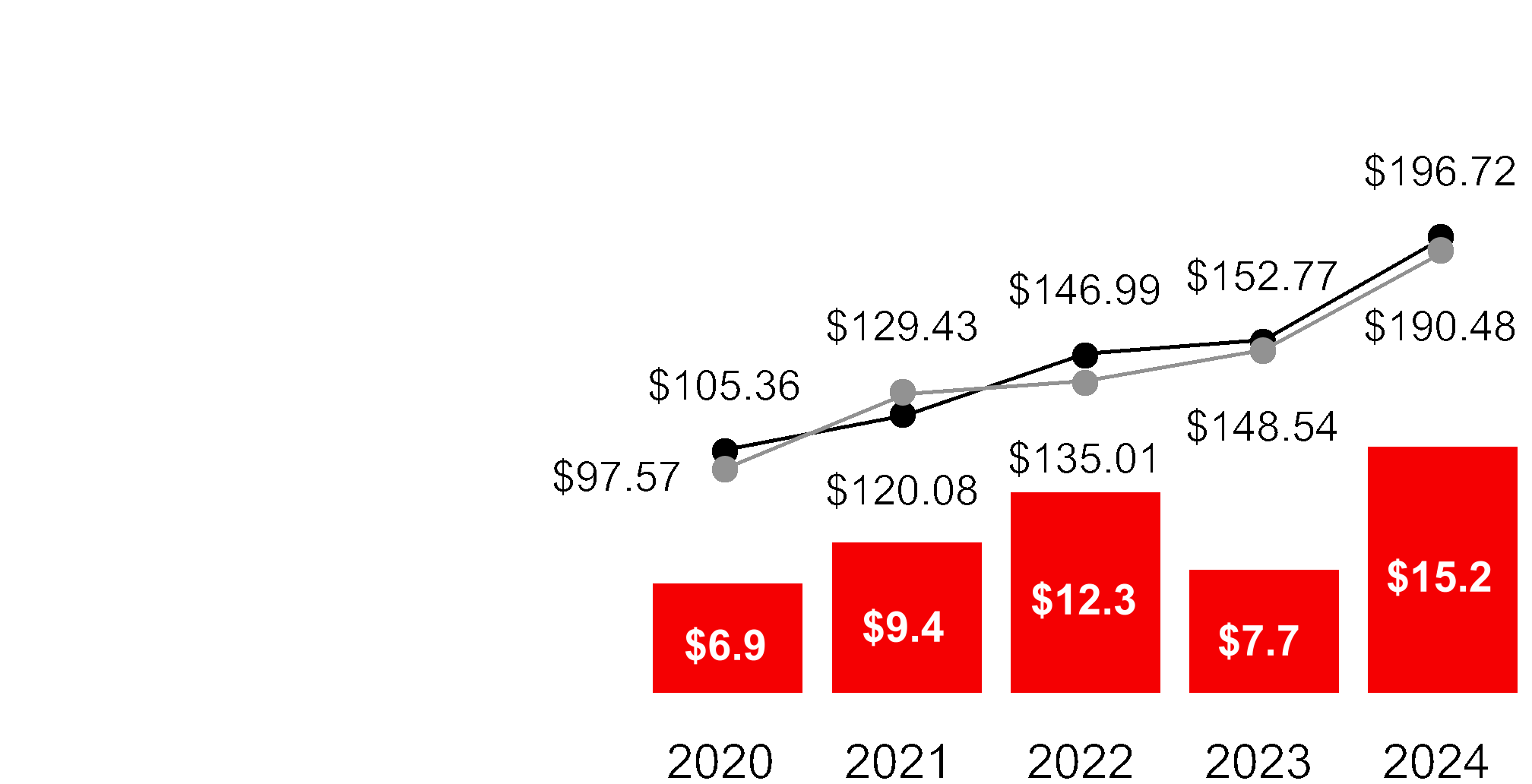
 | Average Non-CEO Compensation Actually Paid ($m)1 | $6.9 | $9.4 | $12.3 | $7.7 | $15.2 | |
 | Total Shareholder Return for Travelers | $105.36 | $120.08 | $146.99 | $152.77 | $196.72 | |
 | Total Shareholder Return for Compensation Comparison Group | $97.57 | $129.43 | $135.01 | $148.54 | $190.48 |
2025 Proxy Statement | The Travelers Companies, Inc.  | 103 |

 | CEO Compensation Actually Paid ($m)1 | $26.5 | $37.3 | $50.4 | $27.6 | $61.2 |
 | Net Income ($m) | $2,697 | $3,662 | $2,842 | $2,991 | $4,999 |

 | Average Non-CEO Compensation Actually Paid ($m)1 | $6.9 | $9.4 | $12.3 | $7.7 | $15.2 |
 | Net Income ($m) | $2,697 | $3,662 | $2,842 | $2,991 | $4,999 |

 | CEO Compensation Actually Paid ($m)1 | $26.5 | $37.3 | $50.4 | $27.6 | $61.2 |
 | Core ROE | 11.3% | 13.7% | 11.3% | 11.5% | 17.2% |

 | Average Non-CEO Compensation Actually Paid ($m)1 | $6.9 | $9.4 | $12.3 | $7.7 | $15.2 |
 | Core ROE | 11.3% | 13.7% | 11.3% | 11.5% | 17.2% |
104 | The Travelers Companies, Inc. | 2025 Proxy Statement  |
Tabular List of Financial Performance Measures |
2025 Proxy Statement | The Travelers Companies, Inc.  | 105 |
Why am I being provided with these materials? |
How do I vote my shares without attending the Annual Meeting? |
What constitutes a quorum? |
Who is entitled to vote? |
106 | The Travelers Companies, Inc. | 2025 Proxy Statement  |
What are the voting deadlines if I do not attend the Annual Meeting? |
May I revoke my proxy or change my vote? |
What is a “broker non-vote” and how does it affect voting on each item? |
What if I receive more than one Notice or proxy card about the same time? |
What do I need to be admitted to the Annual Meeting? |
How do I register for the Annual Meeting and receive an admission ticket? |
2025 Proxy Statement | The Travelers Companies, Inc.  | 107 |
What happens if a change to the Annual Meeting is necessary due to exigent circumstances? |
Are there other things I should know if I intend to attend the Annual Meeting? |
Who will count the vote? |
Could other matters be decided at the Annual Meeting? |
Who will pay the cost of this proxy solicitation? |
What is “householding” and how does it affect me? |
108 | The Travelers Companies, Inc. | 2025 Proxy Statement  |
What am I voting on, how many votes are required to approve each item, how are votes counted and how does the Board recommend I vote? |
Item | Vote Required | Voting Options | Broker Discretionary Voting Allowed(2) | Impact of Abstain Vote | Board Recommendation(3) |
Item 1 – Election of the 10 director nominees listed in this Proxy Statement | Majority of votes cast– FOR must exceed AGAINST votes(1) | FOR AGAINST ABSTAIN | No | None | FOR |
Item 2 – Ratification of the appointment of KPMG LLP as our independent registered public accounting firm for 2025 | Majority of votes present or represented by proxy and entitled to vote on this item of business or, if greater, the vote required is a majority of the voting power of the minimum number of shares entitled to vote that would constitute a quorum at the Annual Meeting | FOR AGAINST ABSTAIN | Yes | AGAINST | FOR |
Item 3 – Non-binding vote to approve executive compensation | FOR AGAINST ABSTAIN | No | AGAINST | FOR | |
Item 4 – Amendment to The Travelers Companies, Inc. 2023 Stock Incentive Plan | FOR AGAINST ABSTAIN | No | AGAINST | FOR | |
Item 5 – Shareholder proposal relating to climate-related pricing and coverage decisions(4) | FOR AGAINST ABSTAIN | No | AGAINST | AGAINST | |
Item 6 – Shareholder proposal relating to ratification of golden parachutes(4) | FOR AGAINST ABSTAIN | No | AGAINST | AGAINST |
2025 Proxy Statement | The Travelers Companies, Inc.  | 109 |
Plan Category | Number of securities to be issued upon exercise of outstanding options, warrants and rights (a) | Weighted average exercise price of outstanding options, warrants and rights (b) | Number of securities remaining available for future issuance under equity compensation plans (excluding securities reflected in column (a)) (c) | |||
Equity compensation plans approved by security holders(1) | 9,732,432(2) | $153.46 per share(3) | 4,236,219(4) |
110 | The Travelers Companies, Inc. | 2025 Proxy Statement  |
2025 Proxy Statement | The Travelers Companies, Inc.  | A-1 |
A-2 | The Travelers Companies, Inc. | 2025 Proxy Statement  |
Twelve Months Ended December 31, | ||||||||||
($ in millions, after-tax) | 2024 | 2023 | 2022 | 2021 | 2020 | 2019 | 2018 | 2017 | 2016 | 2015 |
Net income | $4,999 | $2,991 | $2,842 | $3,662 | $2,697 | $2,622 | $2,523 | $2,056 | $3,014 | $3,439 |
Adjustments: | ||||||||||
Net realized investment (gains) losses | 26 | 81 | 156 | (132) | (11) | (85) | (93) | (142) | (47) | (2) |
Impact of changes in tax laws and/or tax rates(1)(2) | — | — | — | (8) | — | — | — | 129 | — | — |
Core income | $5,025 | $3,072 | $2,998 | $3,522 | $2,686 | $2,537 | $2,430 | $2,043 | $2,967 | $3,437 |
2025 Proxy Statement | The Travelers Companies, Inc.  | A-3 |
As of December 31, | ||||||||||
($ in millions) | 2024 | 2023 | 2022 | 2021 | 2020 | 2019 | 2018 | 2017 | 2016 | 2015 |
Shareholders’ equity | $27,864 | $24,921 | $21,560 | $28,887 | $29,201 | $25,943 | $22,894 | $23,731 | $23,221 | $23,598 |
Net unrealized investment (gains) losses, net of tax, included in shareholders’ equity | 3,640 | 3,129 | 4,898 | (2,415) | (4,074) | (2,246) | 113 | (1,112) | (730) | (1,289) |
Net realized investment (gains) losses, net of tax | 26 | 81 | 156 | (132) | (11) | (85) | (93) | (142) | (47) | (2) |
Impact of changes in tax laws and/or tax rates(1)(2) | — | — | — | (8) | — | — | — | 287 | — | — |
Adjusted shareholders’ equity | $31,530 | $28,131 | $26,614 | $26,332 | $25,116 | $23,612 | $22,914 | $22,764 | $22,444 | $22,307 |
Twelve Months Ended December 31, | ||||||||||
($ in millions, after-tax) | 2024 | 2023 | 2022 | 2021 | 2020 | 2019 | 2018 | 2017 | 2016 | 2015 |
Net income | $4,999 | $2,991 | $2,842 | $3,662 | $2,697 | $2,622 | $2,523 | $2,056 | $3,014 | $3,439 |
Average shareholders’ equity | 25,993 | 22,031 | 23,384 | 28,735 | 26,892 | 24,922 | 22,843 | 23,671 | 24,182 | 24,304 |
Return on equity | 19.2% | 13.6% | 12.2% | 12.7% | 10.0% | 10.5% | 11.0% | 8.7% | 12.5% | 14.2% |
Core income | $5,025 | $3,072 | $2,998 | $3,522 | $2,686 | $2,537 | $2,430 | $2,043 | $2,967 | $3,437 |
Adjusted average shareholders’ equity | 29,295 | 26,772 | 26,588 | 25,718 | 23,790 | 23,335 | 22,814 | 22,743 | 22,386 | 22,681 |
Core return on equity | 17.2% | 11.5% | 11.3% | 13.7% | 11.3% | 10.9% | 10.7% | 9.0% | 13.3% | 15.2% |
Twelve Months Ended December 31, | ||||
2024 | 2023 | |||
Diluted income per share | ||||
Net income | $21.47 | $12.79 | ||
Adjustments: | ||||
Net realized investment losses, after-tax | 0.11 | 0.34 | ||
Core income | $21.58 | $13.13 | ||
A-4 | The Travelers Companies, Inc. | 2025 Proxy Statement  |
As of December 31, | ||||||||||
($ in millions, except per share amounts) | 2024 | 2023 | 2022 | 2021 | 2020 | 2019 | 2018 | 2017 | 2016 | 2015 |
Shareholders’ equity | $27,864 | $24,921 | $21,560 | $28,887 | $29,201 | $25,943 | $22,894 | $23,731 | $23,221 | $23,598 |
Less: net unrealized investment gains (losses), net of tax, included in shareholders’ equity | (3,640) | (3,129) | (4,898) | 2,415 | 4,074 | 2,246 | (113) | 1,112 | 730 | 1,289 |
Shareholders’ equity, excluding net unrealized investment gains (losses), net of tax, included in shareholders’ equity | $31,504 | $28,050 | $26,458 | $26,472 | $25,127 | $23,697 | $23,007 | $22,619 | $22,491 | $22,309 |
Common shares outstanding | 226.6 | 228.2 | 232.1 | 241.2 | 252.4 | 255.5 | 263.6 | 271.4 | 279.6 | 295.9 |
Book value per share | $122.97 | $109.19 | $92.90 | $119.77 | $115.68 | $101.55 | $86.84 | $87.46 | $83.05 | $79.75 |
Adjusted book value per share | $139.04 | $122.90 | $114.00 | $109.76 | $99.54 | $92.76 | $87.27 | $83.36 | $80.44 | $75.39 |
As of December 31, | |||||||||||||
($ in millions) | 2024 | 2023 | 2022 | 2021 | 2020 | 2019 | 2018 | 2017 | 2016 | 2015 | 2014 | 2013 | 2012 |
Invested assets | $94,223 | $88,810 | $80,454 | $87,375 | $84,423 | $77,884 | $72,278 | $72,502 | $70,488 | $70,470 | $73,261 | $73,160 | $73,838 |
Less: Net unrealized investment gains (losses), pre-tax | (4,609) | (3,970) | (6,220) | 3,060 | 5,175 | 2,853 | (137) | 1,414 | 1,112 | 1,974 | 3,008 | 2,030 | 4,761 |
Invested assets excluding net unrealized investment gains (losses) | $98,832 | $92,780 | $86,674 | $84,315 | $79,248 | $75,031 | $72,415 | $71,088 | $69,376 | $68,496 | $70,253 | $71,130 | $69,077 |
Twelve Months Ended December 31, | ||||
($ in millions, after-tax, except as noted) | 2024 | 2023 | ||
Net income | $4,999 | $2,991 | ||
Net realized investment losses | 26 | 81 | ||
Core income | 5,025 | 3,072 | ||
Net investment income | (2,952) | (2,436) | ||
Other (income) expense, including interest expense | 308 | 337 | ||
Underwriting income | 2,381 | 973 | ||
Income tax expense (benefit) on underwriting results | 603 | (7) | ||
Pre-tax underwriting income | $2,984 | $966 | ||
2025 Proxy Statement | The Travelers Companies, Inc.  | A-5 |
Twelve Months Ended December 31, | |||||||||||||
($ in millions, after- tax) | 2024 | 2023 | 2022 | 2021 | 2020 | 2019 | 2018 | 2017 | 2016 | 2015 | 2014 | 2013 | 2012 |
Net income | $4,999 | $2,991 | $2,842 | $3,662 | $2,697 | $2,622 | $2,523 | $2,056 | $3,014 | $3,439 | $3,692 | $3,673 | $2,473 |
Net realized investment (gains) losses | 26 | 81 | 156 | (132) | (11) | (85) | (93) | (142) | (47) | (2) | (51) | (106) | (32) |
Impact of changes in tax laws and/or tax rates(1) (2) | — | — | — | (8) | — | — | — | 129 | — | — | — | — | — |
Core income | 5,025 | 3,072 | 2,998 | 3,522 | 2,686 | 2,537 | 2,430 | 2,043 | 2,967 | 3,437 | 3,641 | 3,567 | 2,441 |
Net investment income | (2,952) | (2,436) | (2,170) | (2,541) | (1,908) | (2,097) | (2,102) | (1,872) | (1,846) | (1,905) | (2,216) | (2,186) | (2,316) |
Other (income) expense, including interest expense | 308 | 337 | 277 | 235 | 232 | 214 | 248 | 179 | 78 | 193 | 159 | 61 | 171 |
Underwriting income | 2,381 | 973 | 1,105 | 1,216 | 1,010 | 654 | 576 | 350 | 1,199 | 1,725 | 1,584 | 1,442 | 296 |
Impact of net (favorable) unfavorable prior year reserve development | (559) | (113) | (512) | (424) | (276) | 47 | (409) | (378) | (510) | (617) | (616) | (552) | (622) |
Impact of catastrophes | 2,632 | 2,361 | 1,480 | 1,459 | 1,274 | 699 | 1,355 | 1,267 | 576 | 338 | 462 | 387 | 1,214 |
Underlying underwriting income | $4,454 | $3,221 | $2,073 | $2,251 | $2,008 | $1,400 | $1,522 | $1,239 | $1,265 | $1,446 | $1,430 | $1,277 | $888 |
B-1 | The Travelers Companies, Inc. | 2025 Proxy Statement  |
2025 Proxy Statement | The Travelers Companies, Inc.  | B-2 |
B-3 | The Travelers Companies, Inc. | 2025 Proxy Statement  |
2025 Proxy Statement | The Travelers Companies, Inc.  | B-4 |
B-5 | The Travelers Companies, Inc. | 2025 Proxy Statement  |
2025 Proxy Statement | The Travelers Companies, Inc.  | B-6 |
B-7 | The Travelers Companies, Inc. | 2025 Proxy Statement  |
2025 Proxy Statement | The Travelers Companies, Inc.  | B-8 |
B-9 | The Travelers Companies, Inc. | 2025 Proxy Statement  |


TO VOTE, MARK BLOCKS BELOW IN BLUE OR BLACK INK AS FOLLOWS: | |||
V63017-P22758-Z89113 | KEEP THIS PORTION FOR YOUR RECORDS | ||
THIS PROXY CARD IS VALID ONLY WHEN SIGNED AND DATED. | DETACH AND RETURN THIS PORTION ONLY | ||
THE TRAVELERS COMPANIES, INC. | ||||||||||||||
The Board of Directors recommends you vote FOR each of the Nominees listed in Proposal 1, FOR Proposals 2, 3 and 4 and AGAINST Proposals 5 and 6. | ||||||||||||||
1. | Election of the ten directors listed below. | |||||||||||||
Nominees: | For | Against | Abstain | |||||||||||
1a. | Russell G. Golden | ☐ | ☐ | ☐ | 2. | Ratification of the appointment of KPMG LLP as The Travelers Companies, Inc.'s independent registered public accounting firm for 2025. | For | Against | Abstain | |||||
1b. | Thomas B. Leonardi | ☐ | ☐ | ☐ | ☐ | ☐ | ☐ | |||||||
1c. | Clarence Otis Jr. | ☐ | ☐ | ☐ | 3. | Non-binding vote to approve executive compensation. | ☐ | ☐ | ☐ | |||||
1d. | Elizabeth E. Robinson | ☐ | ☐ | ☐ | 4. | Amendment to The Travelers Companies, Inc. 2023 Stock Incentive Plan. | ☐ | ☐ | ☐ | |||||
1e. | Rafael Santana | ☐ | ☐ | ☐ | 5. | Shareholder proposal relating to a report on climate- related pricing and coverage decisions, if presented at the Annual Meeting of Shareholders. | ☐ | ☐ | ☐ | |||||
1f. | Todd C. Schermerhorn | ☐ | ☐ | ☐ | ||||||||||
1g. | Alan D. Schnitzer | ☐ | ☐ | ☐ | 6. | Shareholder proposal relating to ratification of golden parachutes, if presented at the Annual Meeting of Shareholders. | ☐ | ☐ | ☐ | |||||
1h. | Laurie J. Thomsen | ☐ | ☐ | ☐ | ||||||||||
1i. | Bridget van Kralingen | ☐ | ☐ | ☐ | IF NO BOXES ARE MARKED AND THE PROXY IS SIGNED, THIS PROXY WILL BE VOTED IN THE MANNER DESCRIBED ON THE REVERSE SIDE. | |||||||||
1j. | David S. Williams | ☐ | ☐ | ☐ | ||||||||||
NOTE: Please sign exactly as the name(s) appear(s) herein. Joint owners should each sign. When signing as attorney, executor, administrator, trustee or guardian, or on behalf of a corporation or other business entity, please give full title as such. | ||||||||||||||
Signature (PLEASE SIGN WITHIN BOX) | Date | Signature (Joint Owners) | Date | |||||||||||

V63018-P22758-Z89113 | ||||
THE TRAVELERS COMPANIES, INC. Proxy Solicited on Behalf of the Board of Directors of The Travelers Companies, Inc. for the Annual Meeting of Shareholders, May 21, 2025 | ||||
The signer(s) hereby constitute(s) and appoint(s) Alan D. Schnitzer, Avrohom J. Kess, and Wendy C. Skjerven, and each of them, the signer(s) true and lawful agents and proxies, with full power of substitution in each, to represent the signer(s) at the Annual Meeting of Shareholders of The Travelers Companies, Inc. to be held on May 21, 2025 at 9:00 a.m. (Eastern Daylight Time) and at any adjournments or postponements thereof, and to vote as specified on this proxy all shares of stock of The Travelers Companies, Inc. held of record by the signer(s) at the close of business on March 24, 2025 as the signer(s) would be entitled to vote if personally present, on all matters properly coming before the Annual Meeting, including, but not limited to, the matters set forth on the reverse side of this proxy. The signer(s) hereby acknowledge(s) receipt of the Notice of Internet Availability of Proxy Materials and/or Proxy Statement. The signer(s) hereby revoke(s) all proxies heretofore given by the signer(s) to vote at the Annual Meeting and any adjournments or postponements thereof. | ||||
This proxy when properly executed will be voted in the manner directed on the reverse side. If this proxy is signed but no direction is given, this proxy will be voted FOR the election of each of the director nominees listed on the reverse side, FOR Proposals 2, 3 and 4, and AGAINST Proposals 5 and 6. It will be voted in the discretion of the proxies upon such other matters as may properly come before the Annual Meeting. | ||||
IF NO BOXES ARE MARKED, THIS PROXY WILL BE VOTED IN THE MANNER DESCRIBED ABOVE. | ||||
CONTINUED AND TO BE SIGNED ON REVERSE SIDE | ||||